Gap-dong: Episode 17
by javabeans
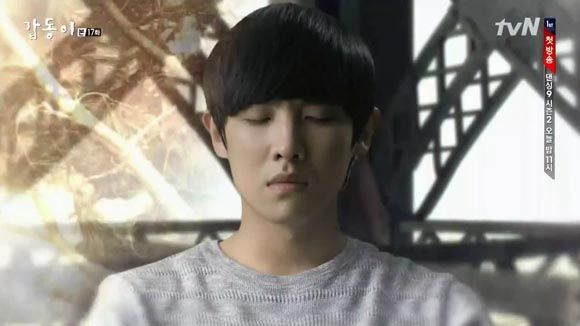
So what happens when your bad guys are identified and caught with four episodes still left to go? Time to crack the code, of course—not the who of the matter, but the why, which is complicated by the appearance of a cipher on the scene. Is that symbology important, or is it a distraction? What does it mean, if it means anything at all? Are serial killers reformable? And is our potentially reformable killer the key to understanding the one that looks to be far gone? The psychology of the case is turning out to have a lot more twists and turns than the murder mystery itself.
SONG OF THE DAY
Lee Seung-hwan – “Fall To Fly” [ Download ]
Audio clip: Adobe Flash Player (version 9 or above) is required to play this audio clip. Download the latest version here. You also need to have JavaScript enabled in your browser.
EPISODE 17 RECAP
Section Chief Cha is released after his 48-hour hold expires, but before he can walk out a free man, the prosecutor and district attorney arrive to proclaim the successful suspension of the Gap-dong statute of limitations. Mu-yeom takes over the investigation, and with a confession on their hands and a flight ban put on Chief Cha, things are looking up for the good guys.
Ji-wool admits to being surprised at the news but accepts it (more readily than she accepted Tae-oh’s involvement, which Mu-yeom points out). Mu-yeom gives her a tracker to keep with her at all times, so he can make sure of her whereabouts. She asks what will happen to Tae-oh now, and whether he’s facing the death penalty.
It’s a question his mother is working on with her crackerjack legal team, who are looking for new angles in their defense case. Right now their priority is avoiding the death penalty, which is comforting in that at least they’re not arguing his innocence, which I wouldn’t be able to accept. They express their relief at Tae-oh finally finding the will to live, which will make their case easier.
Tae-oh, meanwhile, seriously mulls over Maria’s proposal—to spare his life from capital punishment by ripping out the throat of his “hero.” As he is escorted out to meet a visitor, he crosses paths with Poopy in the hallway… and gets stabbed in the side with a shiv fashioned from a toothbrush handle. Poopy mutters crazily, “You phony bastard. I’m the real Gap-dong!”
The police brass offer Chul-gon his old position, and despite his reluctance to come back, he agrees to finish out his career by wrapping up the Gap-dong case.
Mu-yeom waits while Chief Cha packs up his office and approaches him outside to ask a question that’s been nagging him: Why not kill him? Why leave him alone all this time? Chief Cha replies that the didn’t think Mu-yeom would recognize him—one can’t see the Eiffel Tower clearly from right underneath it.
Chief Cha has a question in return, asking why Gap-dong is so important to Mu-yeom when he could drop dead at any moment, given his bullet-in-brain condition. Smirking, he says he’s Mu-yeom’s closest hyung and ought to know that much about him, then leaves him with a casual, “See you when the evidence comes to light.”
Mu-yeom goes in for a brain scan, and I do NOT like the way the camera pans over to the doctor’s name—that’s code for “This guy’s gonna be evil, right?” Whatchoo thinking of doing, Dr. Noh?
After the scan, Dr. Noh reports the findings to Chief Cha—Mu-yeom’s prospects are not good, and he’s suffering a subdural hemorrhage that requires immediate surgery. Chief Cha’s first question: “What happens if he doesn’t get surgery?” Then he goes home and hears from his worried wife that the police came by and confiscated more things from his home.
The Eiffel Tower mention is enough to get our cops wondering about its meaning, considering Chief Cha’s reference to it as well as the figurine on his desk which housed a letter opener. Chul-gon speculates whether it might be a type of trophy for Cha, and the results of an analysis of its pictures prompt him to wonder whether it could be a type of code, akin to the Zodiac killer’s cryptograms.
Tae-oh’s legal team calls the prosecutor in to say that his mother wants him returned to his original condition. Aside from the fact that this is an impossible order, I’m wondering whether I ought to be worried that the prosecutor is within their midst, though for now he’s not acting shady.
The lawyers, on the other hand, are chock-full of shady. They approach the various inmates at the psychiatric hospital to buy their testimonies for outrageous sums.
Mu-yeom visits Tae-oh in his luxurious hospital ward and puts the hunting dog to work, showing him a photo of the Eiffel Tower and asking whether it could be some kind of memento. Tae-oh says quite possibly, and that it’s likely to be something that would go unnoticed by the average person but could carry meaning for the killer, hinting at details of whom he killed and how.
Tae-oh barely gives the photos a second glance, though, acting supremely bored by it all. He just notes that Maria hasn’t been by to see him, and Mu-yeom barks that if he wants more attention, he’d best treat this with more seriousness.
Tae-oh calls Maria to ask if she’s going to come see him in the hospital, and she’s as curt with him as before. But she seems to soften a bit when Tae-oh asks haltingly whether she’d put Poopy up to the task of stabbing him, though he hastily retracts the question.
Ji-wool gets to work on her new webtoon, “Cohabitation,” which is about a detective killer. The editor asks whether psychopaths are reformable, and she doesn’t have the answer. But that is apparently her new challenge, and she shows up in Tae-oh’s hospital room with her materials in hand, calling him Raskolnikov (the protagonist of Crime and Punishment). She isn’t his Sonya, she informs him, but she declares her intention to make a person of him yet, calling it an act of noblesse oblige.
Declaring this the start of a “journey of emotions,” Ji-wool lays out her materials and hands Tae-oh a crayon, telling him to draw whatever he’s feeling. So Tae-oh puts crayon to paper and scribbles a messy face onto the pad, which Ji-wool quickly notes shows no emotion. She strips down the basics of emotion in the most barebones way, showing him cartoon figures of people in happy moments—a mother with baby, children playing, and the like.
While he’s still under suspicion over his “confession,” Profiler Han holds up well in prison—or at least, puts on a happy face for his worried wife, who visits daily. He says the strict diet and exercise is doing wonders for his health, and seems optimistic over the prospects of the investigation.
Mu-yeom continues to look into the Eiffel Tower as a clue, and speculates over its own history with a statute of limitations (of a kind)—when first erected, citizens so hated the ugly structure that they made plans to tear it down within twenty years. Chul-gon wonders if that’s why Chief Cha fixed it as his symbol. The photo they’ve been analyzing comes from Gustave Eiffel’s office, located at the top of the tower itself.
Maria meets with Chief Cha’s wife again, and asks if she’s eve noticed him acting strangely—upset, or angry, perhaps. Wife Cha starts to say, “Actually…” but cuts herself off and blurts that nothing of the kind has even happened. When Maria attempts to probe further and suggest that the wife could persuade him to seek forgiveness, the wife gets angry and blurts that he hates the word “forgiveness” above all others.
But that’s a ploy, because she then reports to Chief Cha that she mentioned that bit about forgiveness at his instruction.
Ji-wool looks over Tae-oh’s drawings, noting the furiously scribbled drawings on every page. She takes out a wood block, nails, and a hammer, pointing out that he’s clearly angry (“But I’m always angry,” he replies matter-of-factly). Now when he feels upset, she instructs him to hammer a nail into the block.
To the defense lawyers’ ire, the prosecution manages to line up the two Gap-dong cases for back-to-back trials, with Profiler Han’s trial up first and Tae-oh’s to follow. Tae-oh hears the news (that he’s being set up to fail, basically) and tries to channel his rage as Ji-wool instructed. At first he taps ineffectually at the nails, but grows angrier and angrier and slams them into the wood block.
Mu-yeom hears of Ji-wool’s interference and chides that her attempt to make a person of Tae-oh is misguided: “Can you really forgive a murderer?” She concedes that he’s right, but asks, “Can’t you give him just one more chance?”
Mu-yeom confronts Chief Cha about testifying at his case. Chief Cha is all set to refuse to testify, but Mu-yeom points out that while he has the right, it looks suspicious and only adds to the appearance that he’s guilty.
Maria happens by a storefront as Chief Cha is being attended to in a hair salon for a haircut. This makes her recall Mu-yeom’s story about the Spanish woman who attacked her daughter’s rapist in a barbershop and set him on fire. Burning with rage, Maria imagines herself storming into the building and dousing him with gasoline, holding a lighter aloft and ready to blow.
It’s a frightening thought, and Maria shakes it aside. This is exactly the line of thinking that the monk worries she’ll travel toward, having sensed a thread of instability in her after Chief Cha was revealed to be Gap-dong. The monk urges Mu-yeom to pay attention, and for good reason as we see Maria confiding in Profiler Han when she visits him in prison. She wonders how he could have lived without betraying any hint of conflict or upset.
Chief Cha seeks Maria out at her trailer to take issue with her seeking out his wife. Maria says that the encounter made her rethink her stance, because it’s rare to see a psychopath who’s able to carry on a marital relationship without slipping up in his facade—perhaps she had him pegged wrong, she suggests. She invites him in for coffee and, intrigued, he joins her.
Maria keeps a close eye on Cha as she explains that she’s had doubts about her memory of Gap-dong lining up with her impressions of Cha. It seems she’s testing out a theory of some sort, based on the careful way she broaches this line of conversation, and Cha insists upon his innocence, looking every bit the kind, thoughtful person he seemed at the outset.
And then, Maria gets down to business, slapping down the photo of herself with her dead best friend, her voice turning hard. Recalling his wife’s comment about the word “forgiveness,” Maria deliberately provokes him with that word, telling him to shake off his mask and beg for forgiveness.
It works, and something stirs in Cha and bubbles forth, and suddenly he’s shoving her to the wall and strangling her, his face contorted in fury.
But then, almost as quickly as the rage set in, it ebbs away and Cha backs away in shock, looking genuinely horrified at his own reactions. Meek once more, he apologizes profusely and asks what he’s done, saying that he must have been overly stressed by recent events. In a daze of regret and alarm, Cha excuses himself.
That leads Maria to pinpoint her hunch on dissociative disorder, wondering if perhaps Cha is suffering from multiple personalities. She runs the theory by a colleague, citing a few high-profile cases of criminals who used it as a defense for committing crimes. Her doctor friend says that there are cases where the diagnosis resulted in an acquittal, suggesting that it might happen here.
Despite his initial indifference, Tae-oh finds himself increasingly absorbed with the puzzle of the Eiffel Tower, starting at that photo for hours, searching for clues. Closing his eyes and immersing himself in the matter, Tae-oh thinks hard for what kind of meaning it could hold for a killer, but it eludes him, to his everlasting frustration.
Tae-oh thinks to Chief Cha’s offer of freedom, and how he’d told him that Maria would drag him to the death penalty, no matter what she promised him in the present. He wonders if that freedom is an illusion of having stopped—to make the world believe you’d stopped when you hadn’t. “Is that it? Did you merely want to boast about that?” he wonders.
The detective team arrives at the multiple personality conclusion on their own, as the specialist theorizes that the shot of the Eiffel Tower combines the perspectives of many different people. What if the criminal is also in possession of multiple perspectives? The idea takes root in Mu-yeom’s mind, who goes with it.
Maria takes her concern to the district attorney’s office, suggesting that Chief Cha needs to undergo an evaluation to see whether he’s fit to testify. She’s not certain of her suspicions and agonizes over it, and once Mu-yeom hears about her line of thinking, he requests to see her.
He asks what prompted her shift, and why she’s trying to understand the criminal now. Is she afraid the prosecutor will lose, and that if he’s going to go free, she’s better off forgiving? Is this her idea of compromise?
Mu-yeom barks that she’s fallen for Chief Cha’s trap, and that he’s maneuvering her according to his wishes. Maria argues that there may be something they’re missing—she wants to understand Gap-dong’s motivations, “Because I have to do that to leave it behind me.”
But Mu-yeom looks at her in disappointment, saying that he thought they were on the same page. But now, he sees that they can’t work out, and requests that she drop out of the case. His voice has a harsh edge to it and he says he’s tired of his two women—one insisting on teaching Tae-oh human emotions, and the other suggesting that Gap-dong has multiple personality disorder.
“Both Gap-dong and Kim Jae-hee—I’m done with them. Do you understand?” To hammer in his point, Maria flashes back to his earlier comment about finding in her a message not to compromise. I suppose he sees her as reneging on that promise now.
Mu-yeom gets up to leave, and Maria stops him. A bit fearfully, she asks him to explain how he means to end this all. But he just tells her bluntly that their goal of catching Gap-dong was the only thing they had in common, and now they’re over.
Maria says that she doesn’t quite understand, “But you do what you have to do. I’ll do what I have to do.” She lets go of his arm, and he storms out.
Chief Cha confirms for us what everyone suspects: He confides to his wife that he harbors multiple personalities, which include Chief Cha and Gap-dong. Others include an elderly ex-fighter and a seven-year-old child.
Chul-gon doesn’t believe in the multiple personalities as a genuine explanation for Cha’s behavior, but rather concludes that this is Cha’s literal get-out-of-jail card. He’d seemed curiously unperturbed about being accused of his crime and being barred from leaving the country, and now Chul-gon speculates that it’s because Cha had known he still had an ace in the pocket. He must have been preparing this defense for a while, in readiness for the day he might be caught.
The problem for the authorities, however, is that whether or not the diagnosis is real, if it’s proclaimed to be legitimate, they lose their ability to nail him with his testimony. Mu-yeom worries most for Maria, and that she will be used by both Gap-dongs in their trials.
Tae-oh calls Maria, who steels herself before answering. He’s thinking of Cha’s words as he asks if she’d let him go free if he helped take down Cha, and judging from her hesitation he guesses that Cha was right—Maria won’t let him go, as she is a victim first, doctor second. But Maria surprises him, about to say something.
Mu-yeom tells Chul-gon that they have to do something in order to get Gap-dong for good, and to protect Maria. But we’re left hanging on both these fronts, as the question hangs in the air and the episode cuts out for the day.
COMMENTS
I’m left wondering a number of things at the end of this episode, and ultimately all my questions boil down to the central concept of motivation. Is Cha’s motivation a genuine case of multiple personality disorder, or is it a carefully thought-out defense strategy, which he has had twenty years to perfect for just this occasion? Is his wife completely on his side, or did his confession scare her? We don’t see her being scared at his admission, but any sane human being would be at the revelation that her husband was harboring a split personality that included a serial murderer.
Is Maria acting out of a desire to understand, or is this another defense mechanism for her, as Mu-yeom suggests? Recall that just one episode ago she was brimming with rage and begging Mu-yeom to flout the law and fabricate false evidence to nail Cha to the wall, because it was more important to capture him than to do it the legally pristine way.
As for Mu-yeom, is he truly at the end of his rope and through with Maria, or is he walking the road of the Noble Idiot because of his brain scan/death sentence? The words he speaks make perfect logical sense to me, but the breakup still felt awfully abrupt, and makes me suspect that he’s working a new angle—either a ploy to be nobly sacrificing, or to trap Cha. I don’t have to tell you guys that I’m hoping it’s the latter, since noble idiocy is so 1990s. The strategically cut conversation(s) ending our episode suggest that there are bigger, possibly secret plans in the works, in which case I really hope he’s got something up his sleeve.
If I have a complaint, it’s that this drama always ruins its own dramatic punchline by deflating the tension before it even has a chance to build properly. I appreciated the twist of giving Cha split personalities, and also the ambiguity of not knowing whether it’s a true scenario or merely another ruse, but we weren’t given much of a chance to let that sink in before the show then revealed Cha explaining his personalities to his wife. It’s the equivalent of telling a joke, and dissolving into giggles before you say your punchline—you think you’re clever for coming up with the joke, but everyone else misses the impact of it because you didn’t let it land properly.
I’m not sure how I feel about Tae-oh’s search to find humanity, or rather, Ji-wool’s attempt to find it for him. On one hand, it’s perfectly in line with her character, but on the other, can we stop trying to humanize the killer please? I guess that is just going to be this show’s legacy.
RELATED POSTS
- Gap-dong: Episode 16
- Gap-dong: Episode 15
- Gap-dong: Episode 14
- Gap-dong: Episode 13
- Gap-dong: Episode 12
- Gap-dong: Episode 11
- Gap-dong: Episode 10
- Gap-dong: Episode 9
- Gap-dong: Episode 8
- Gap-dong: Episode 7
- Gap-dong: Episode 6
- Gap-dong: Episode 5
- Gap-dong: Episode 4
- Gap-dong: Episode 3
- Gap-dong: Episode 2
- Gap-dong: Episode 1
Tags: featured, Gap-dong, Kim Ji-won, Kim Min-jung, Lee Joon, Sung Dong-il, Yoon Sang-hyun
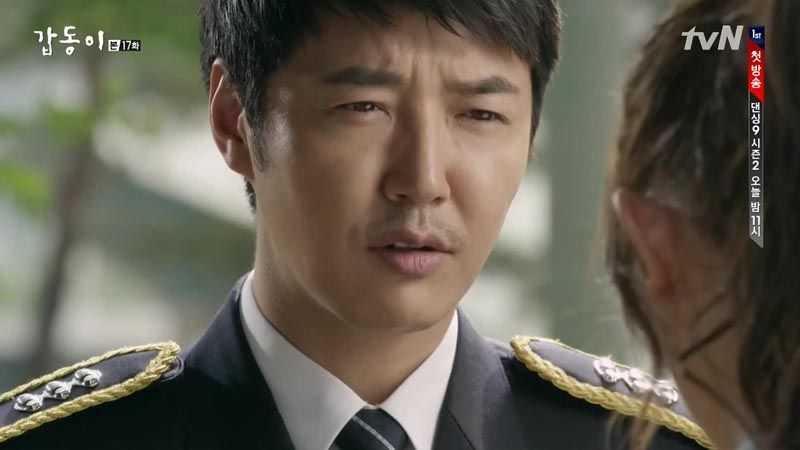
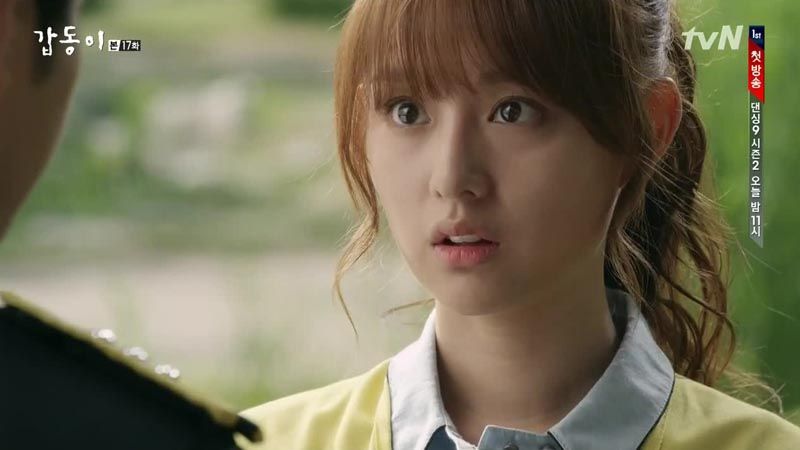
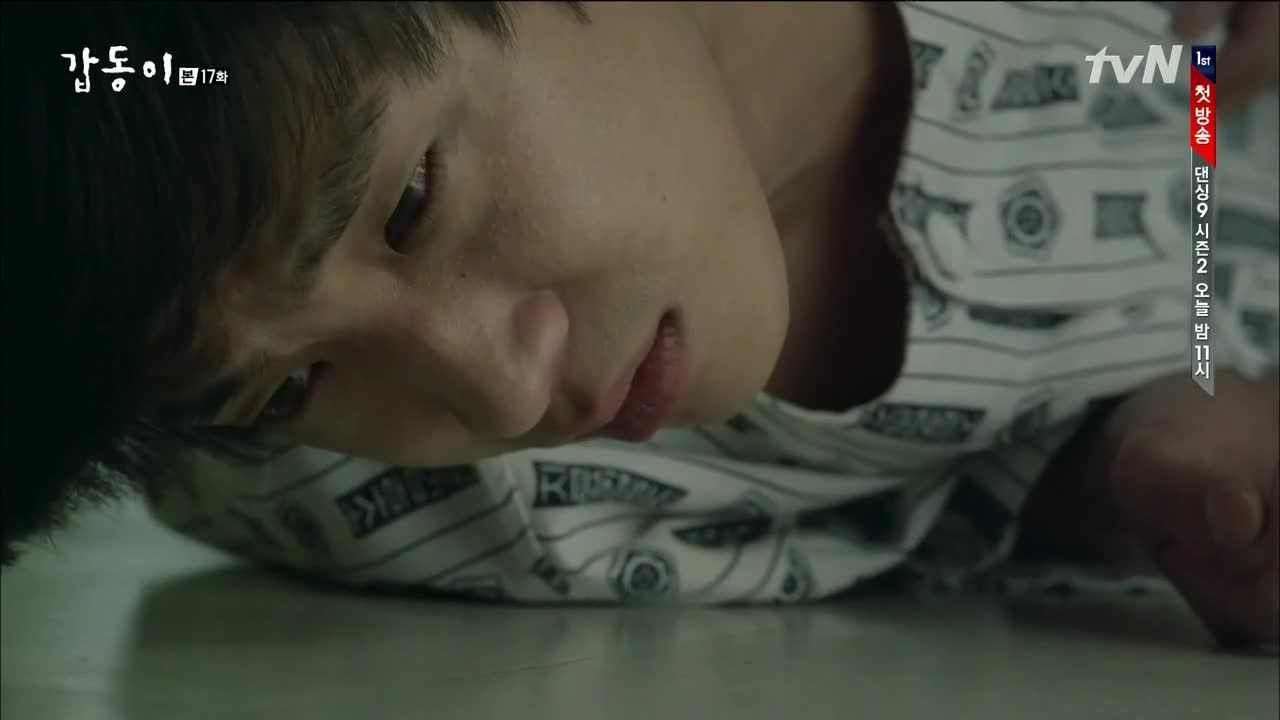
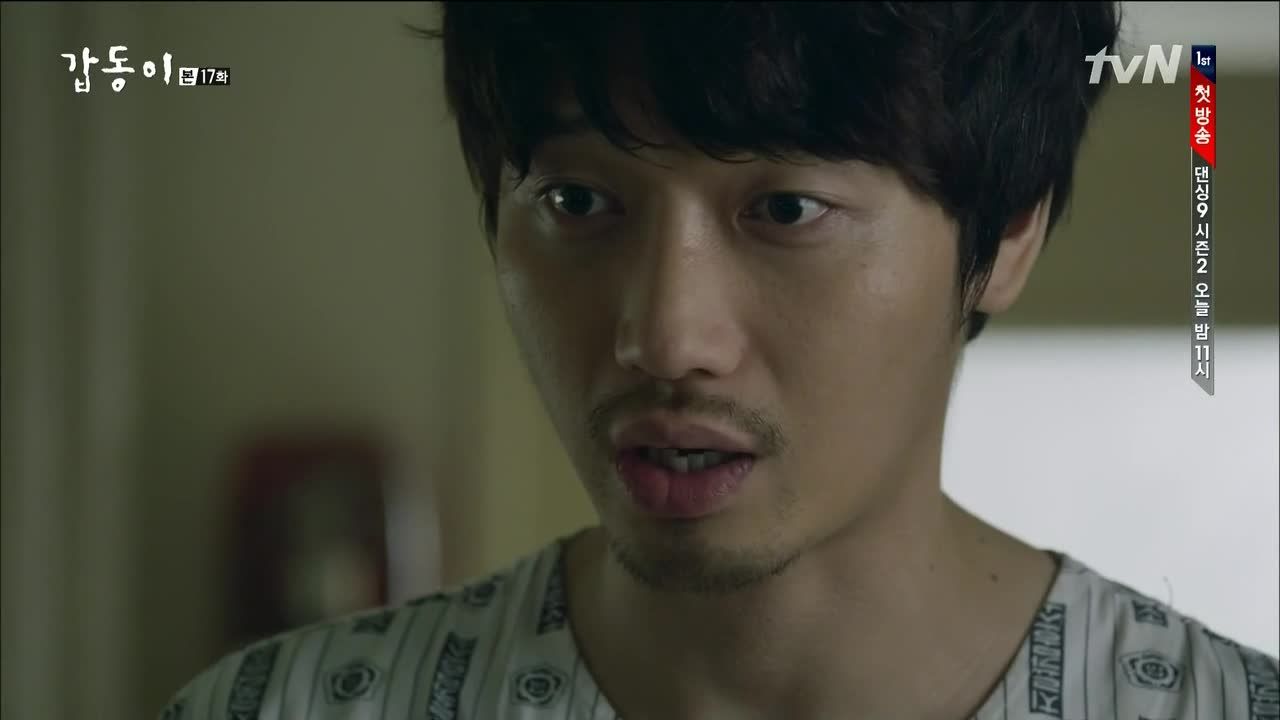
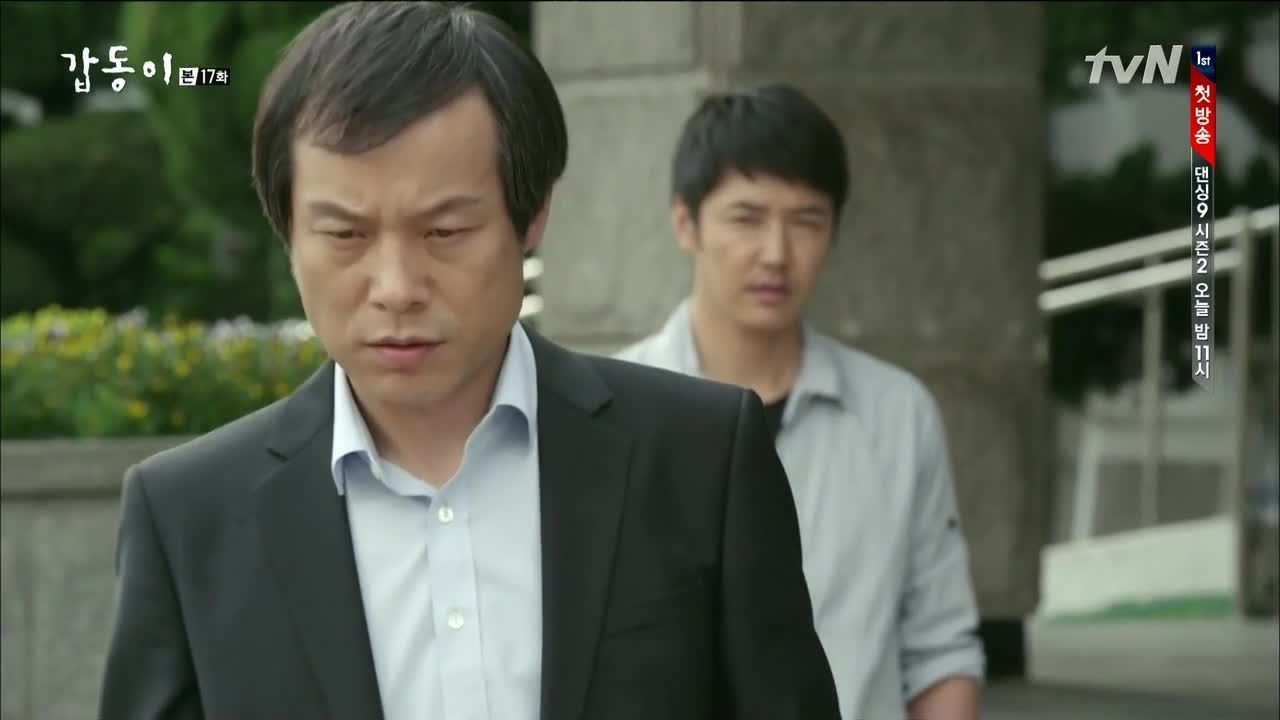
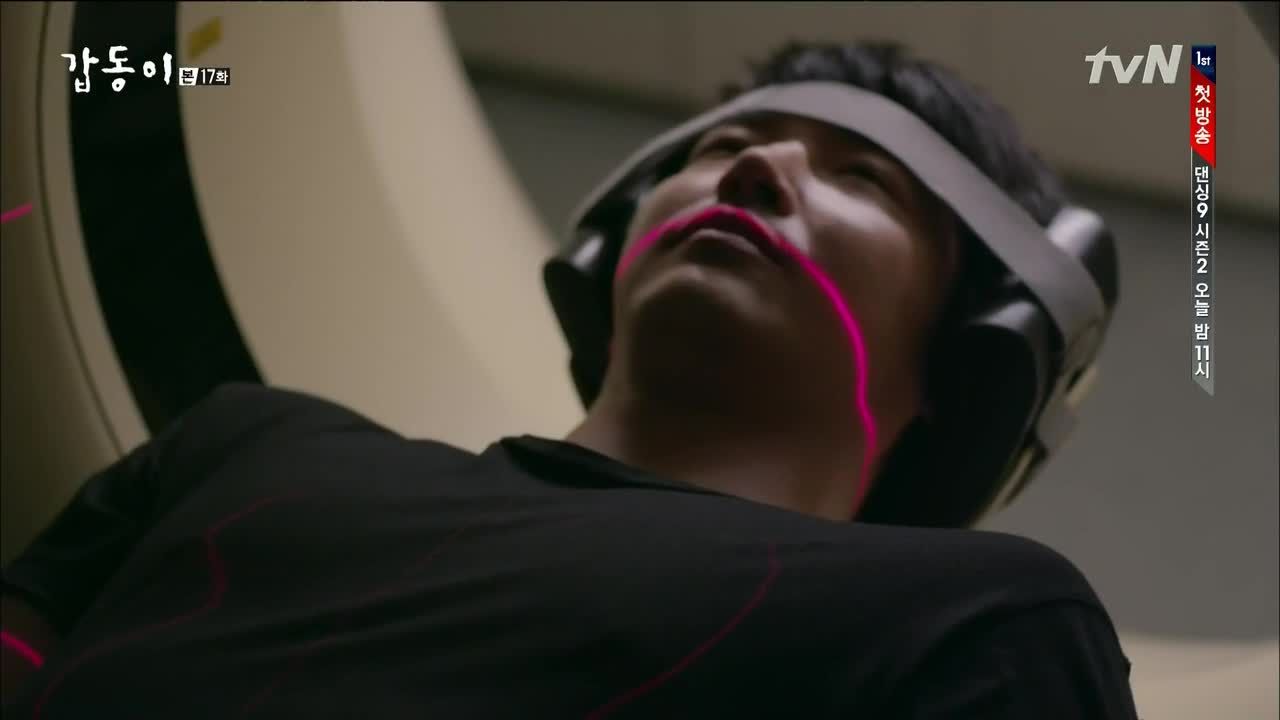
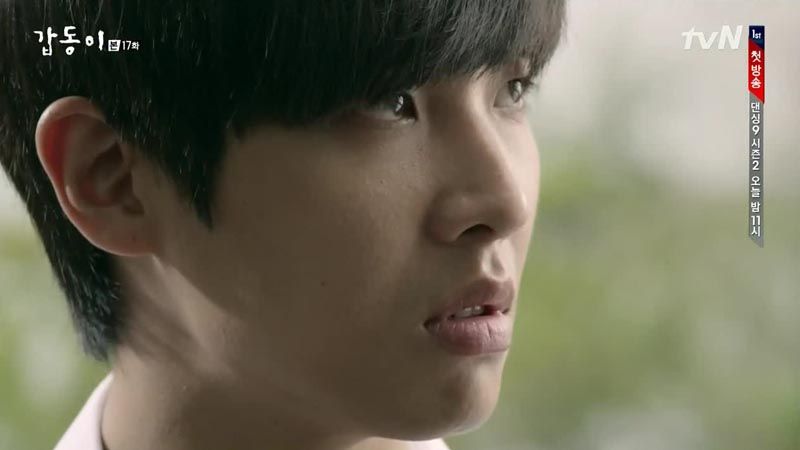
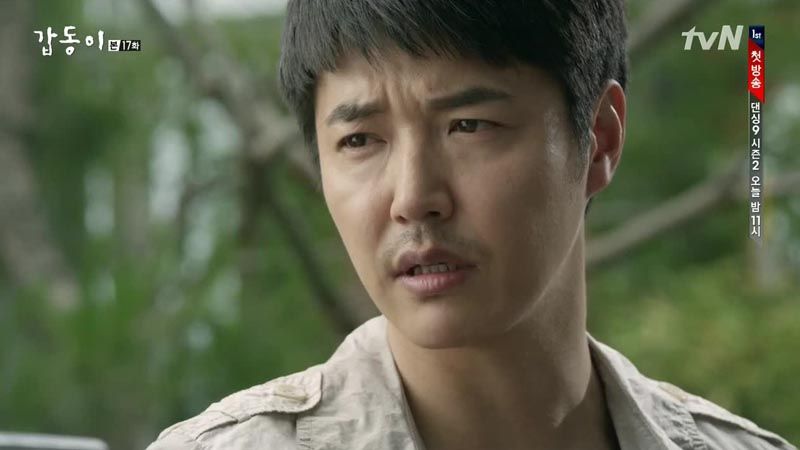
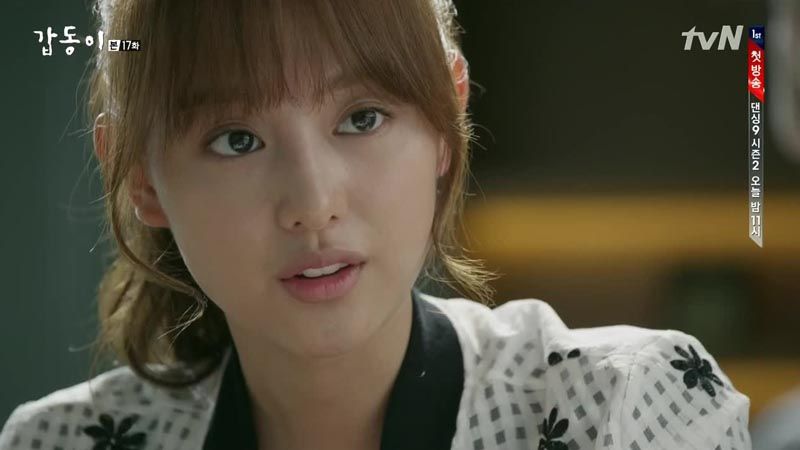
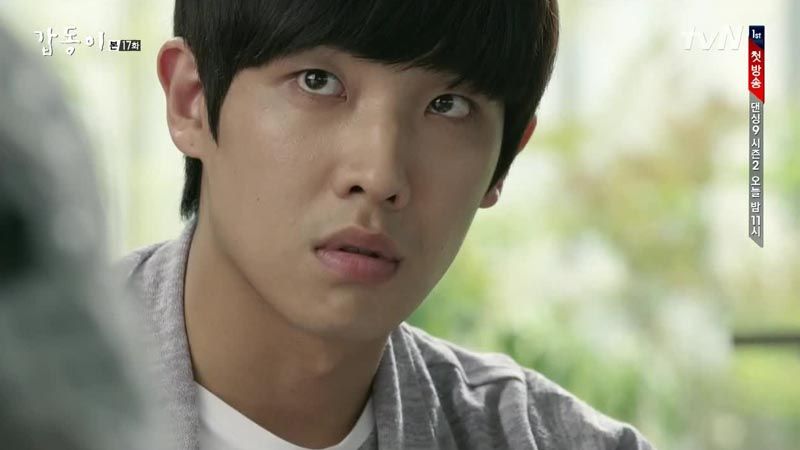
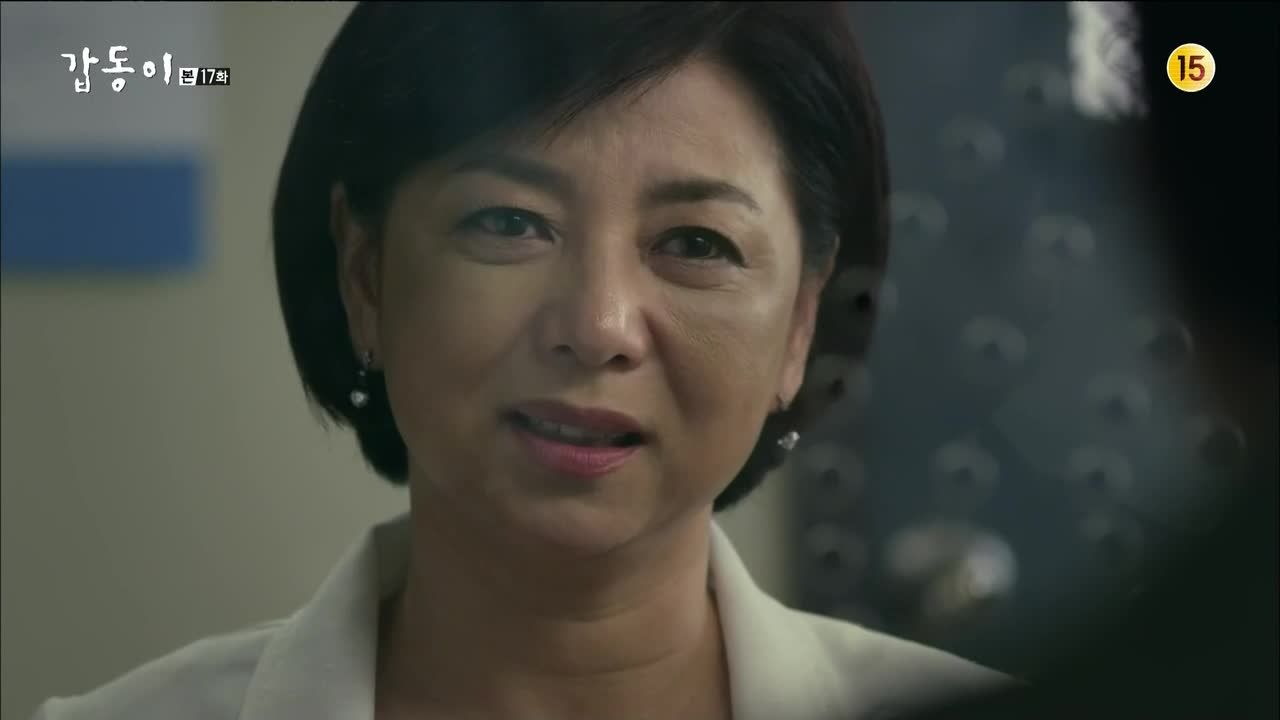
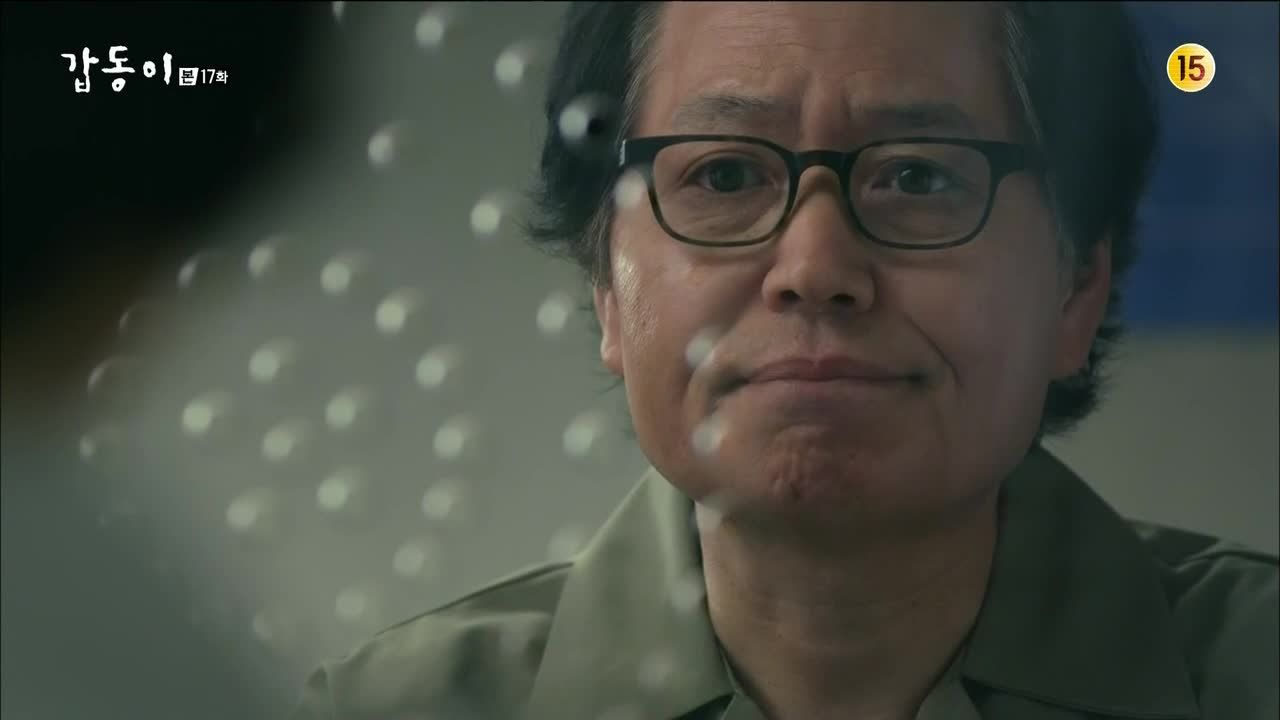

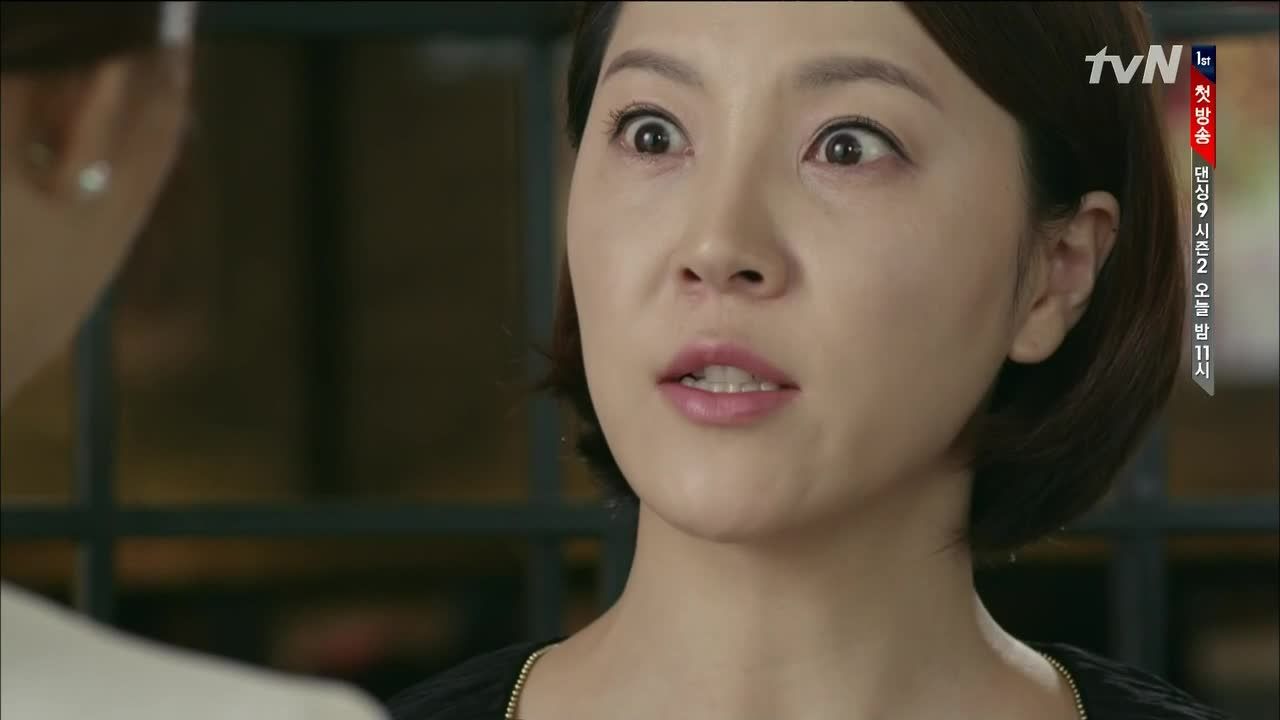
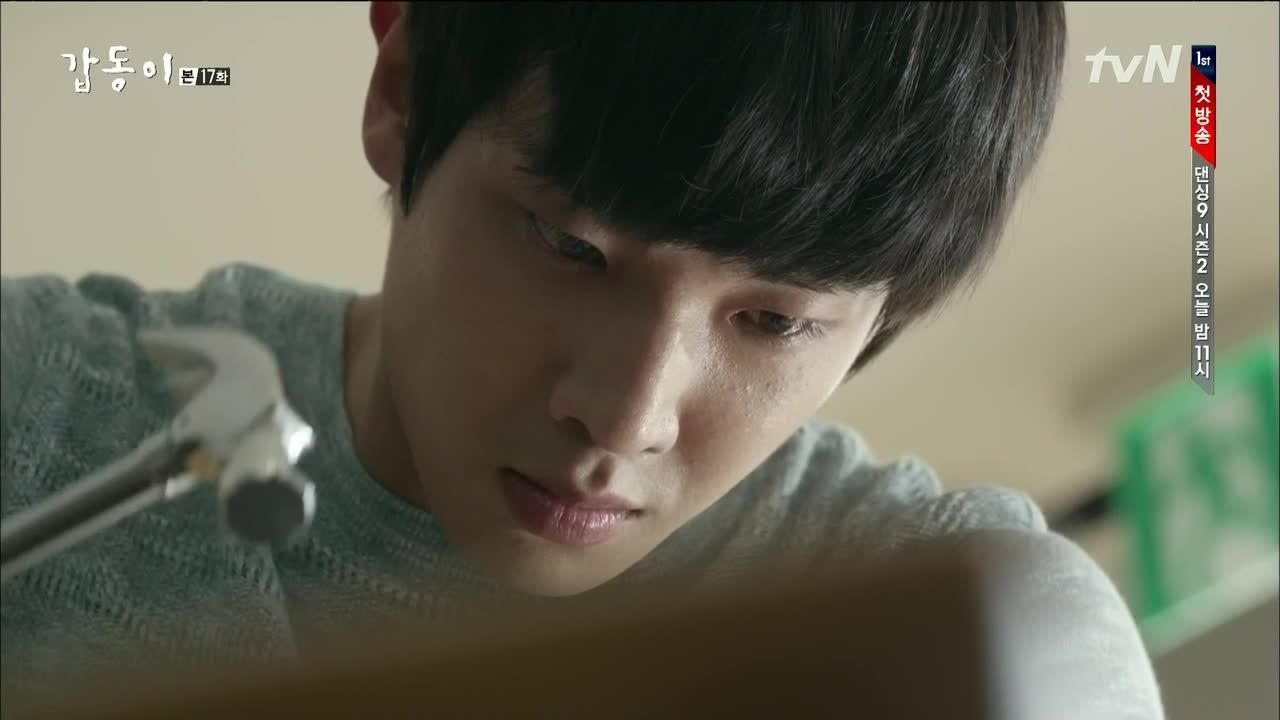
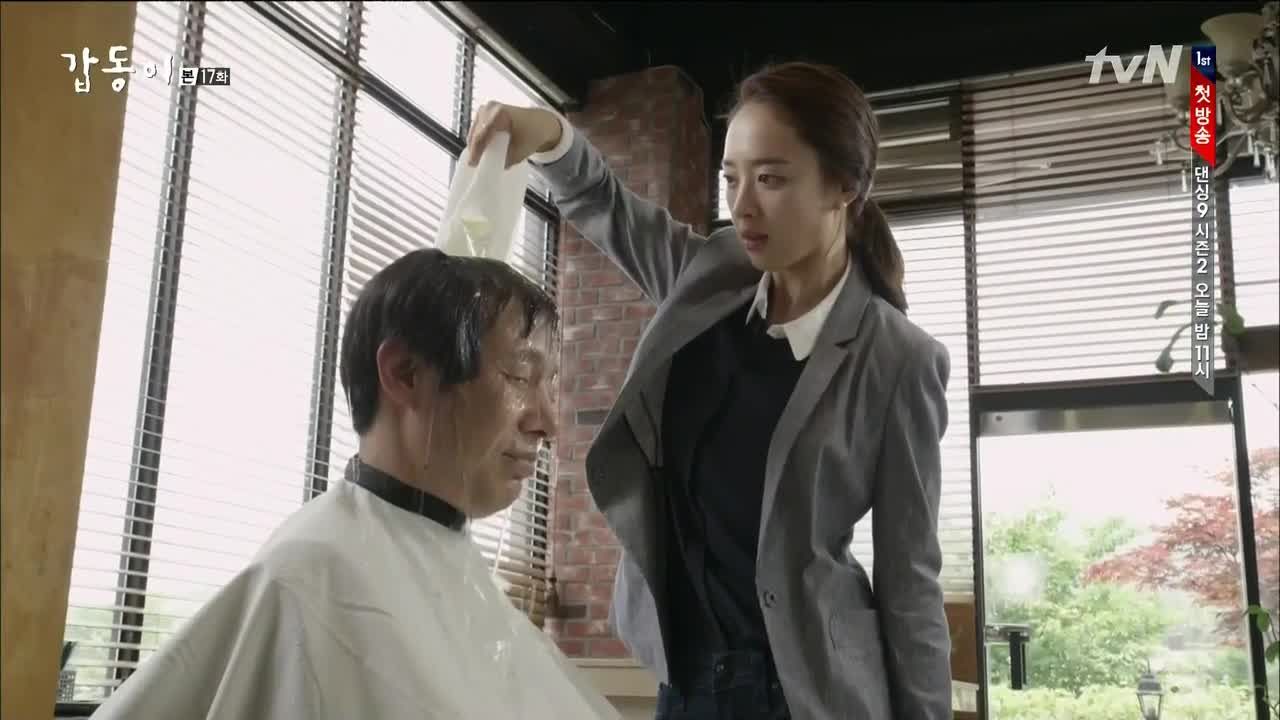
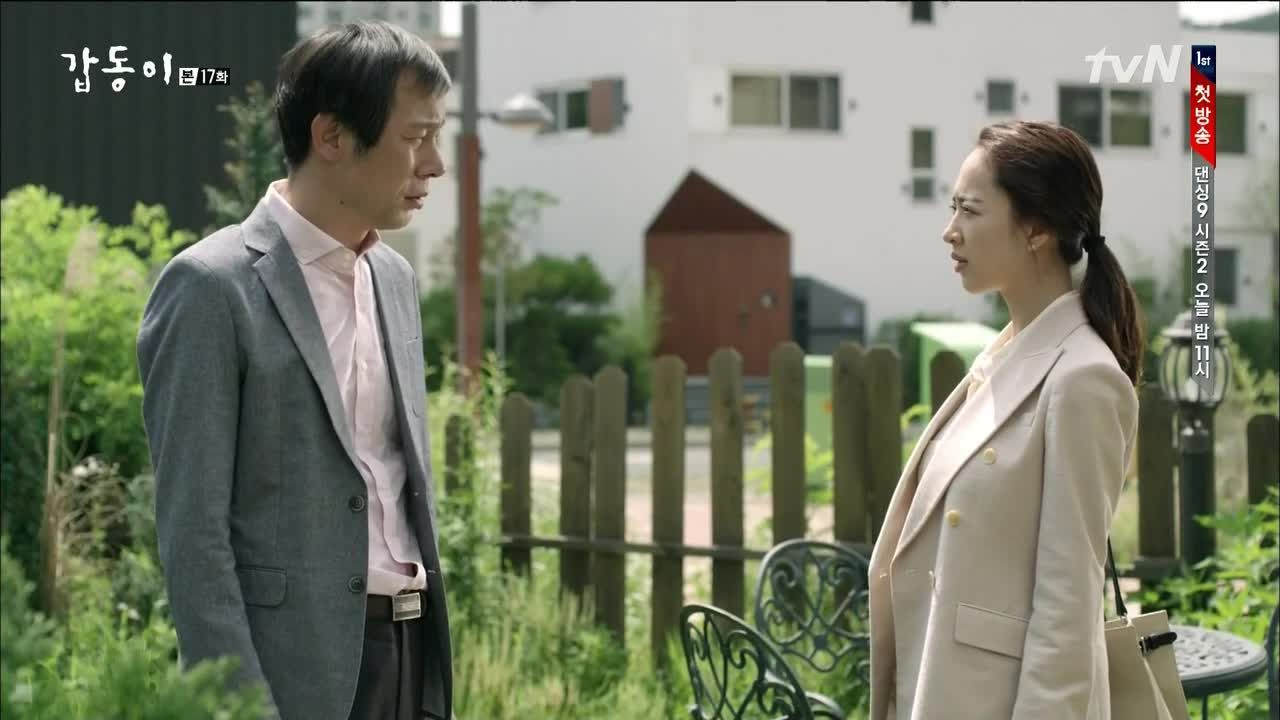
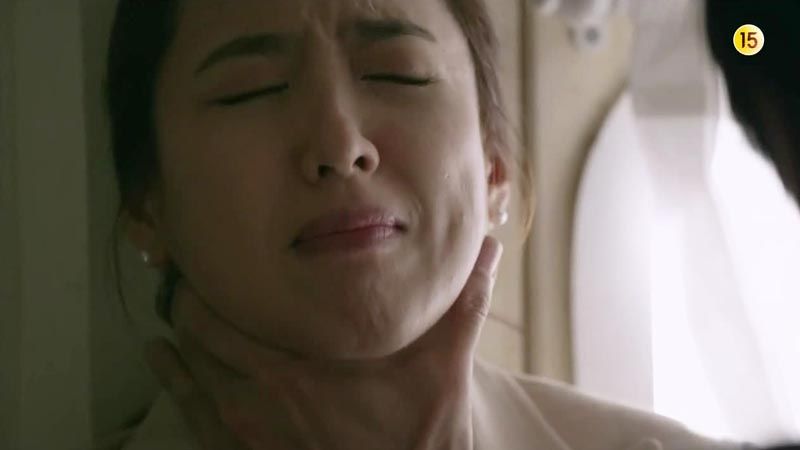
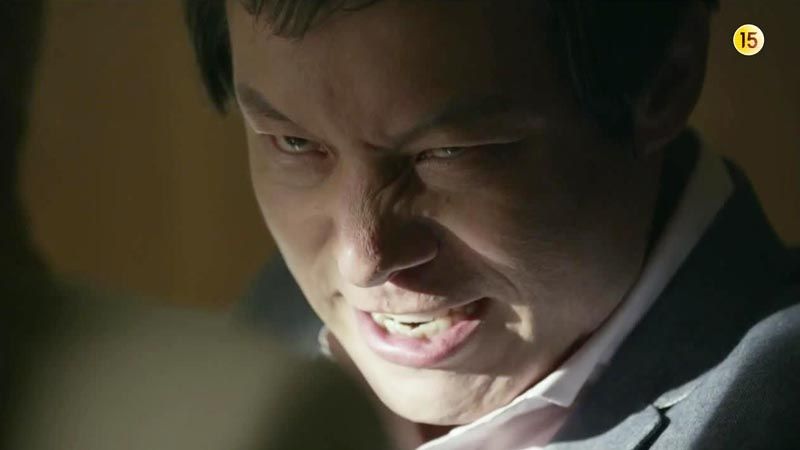
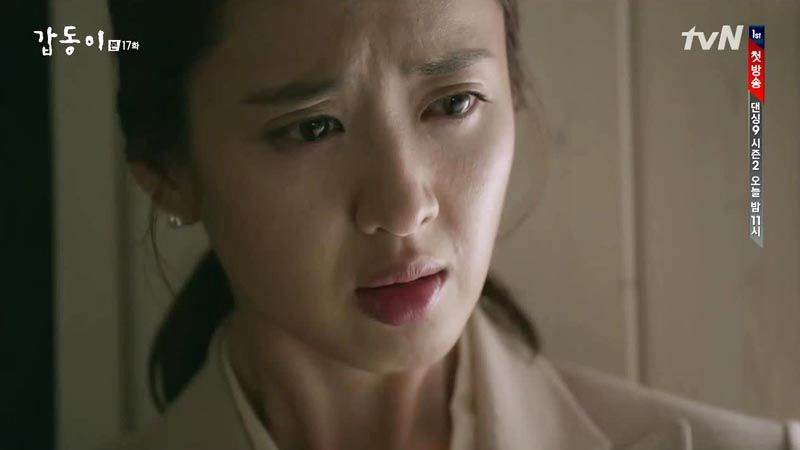
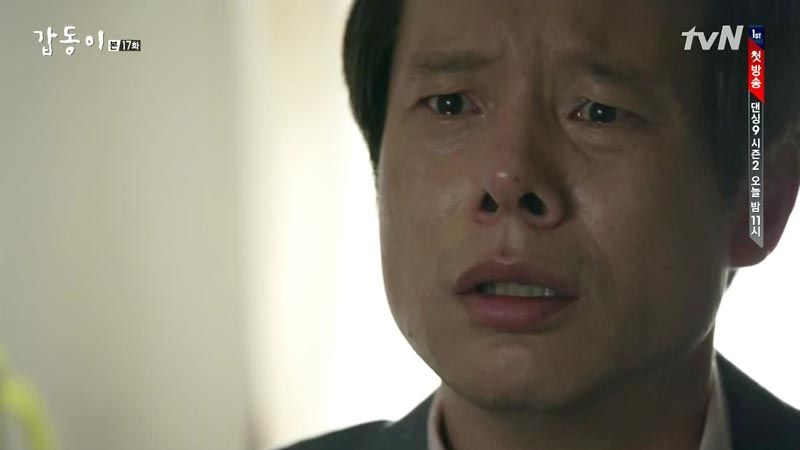
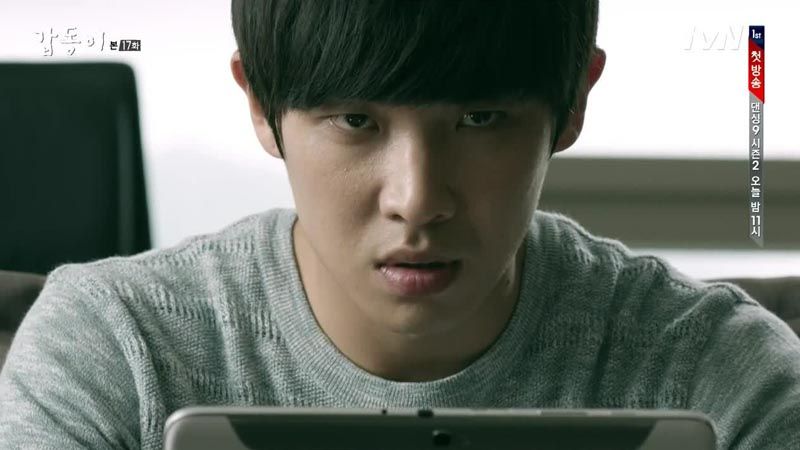
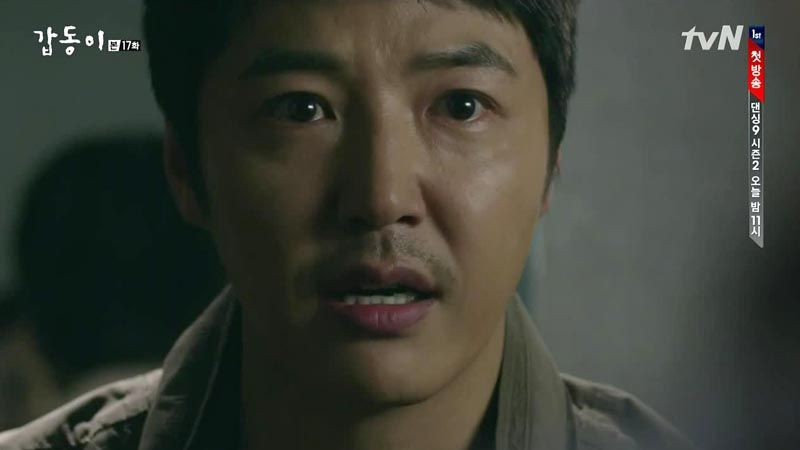
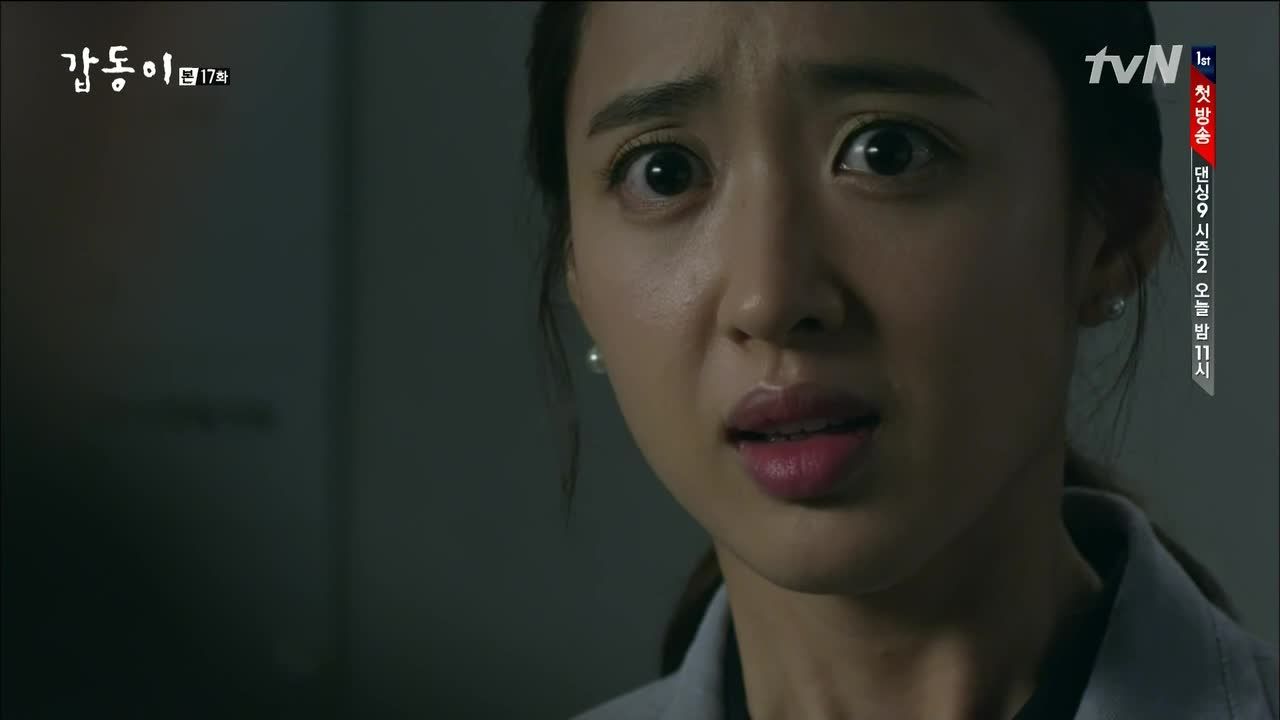
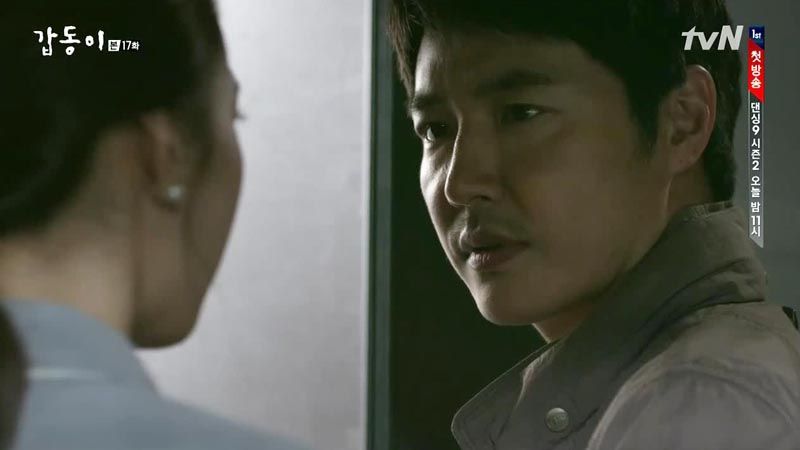
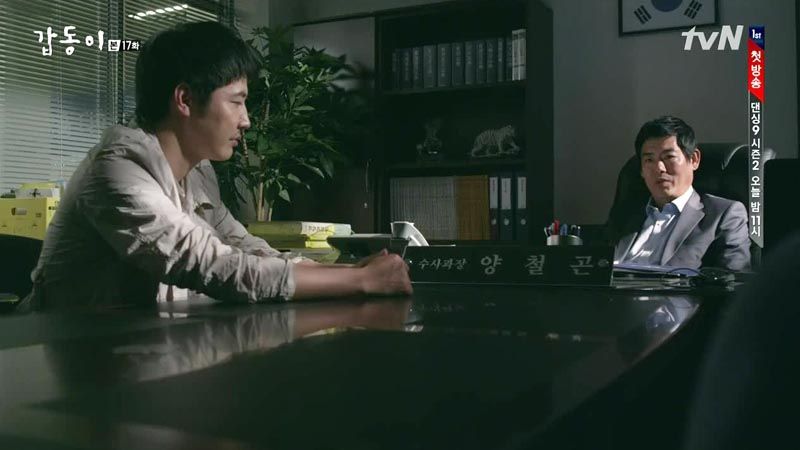
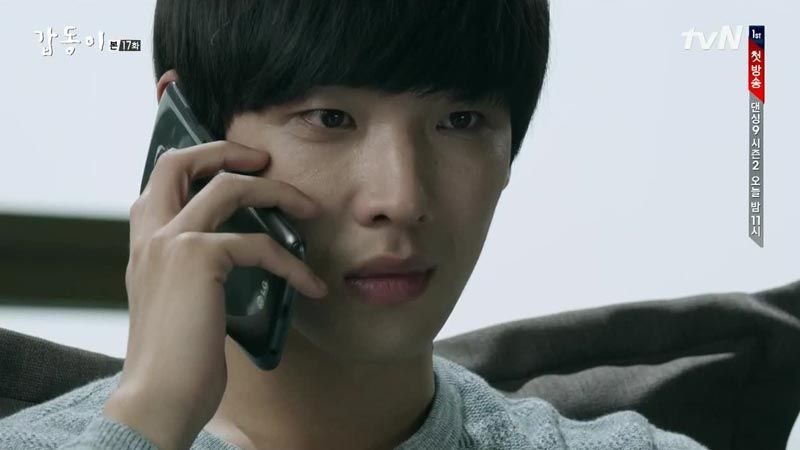
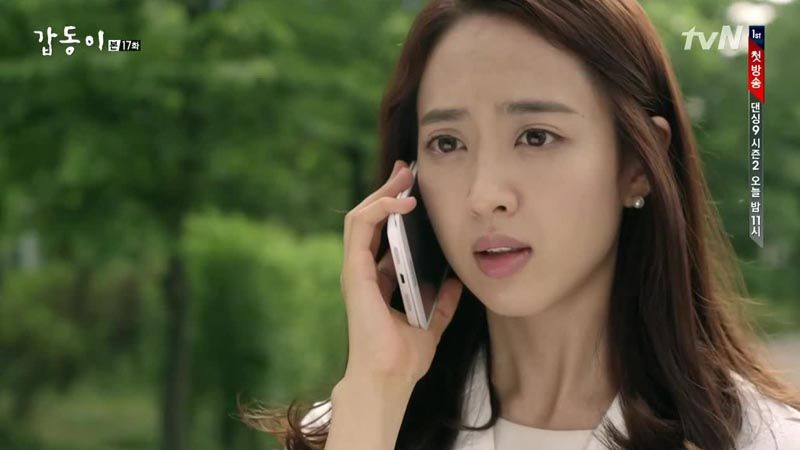
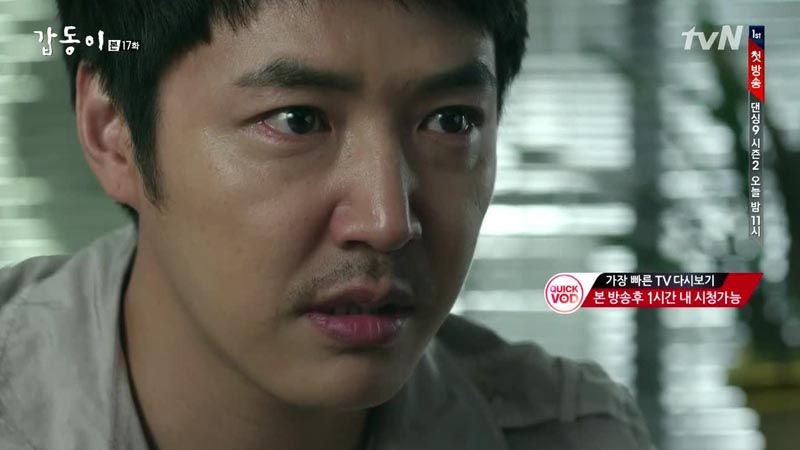
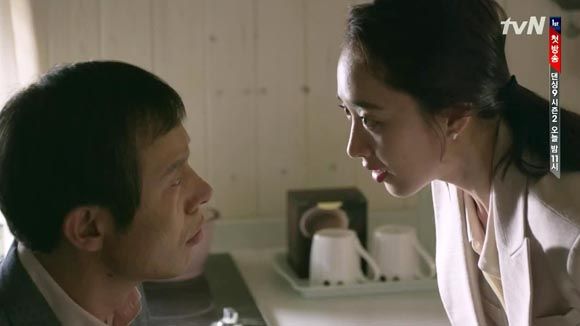
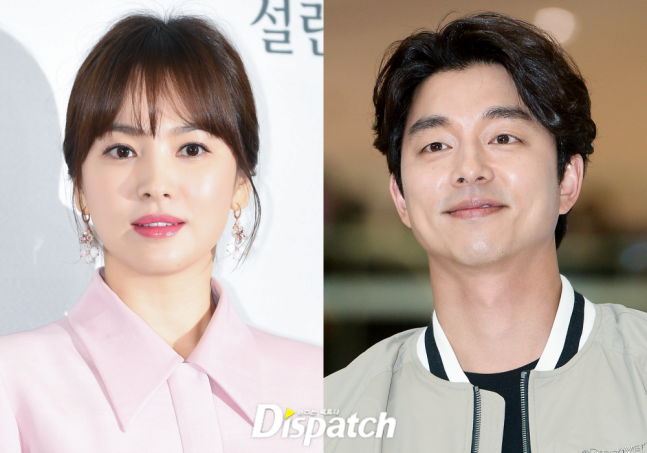
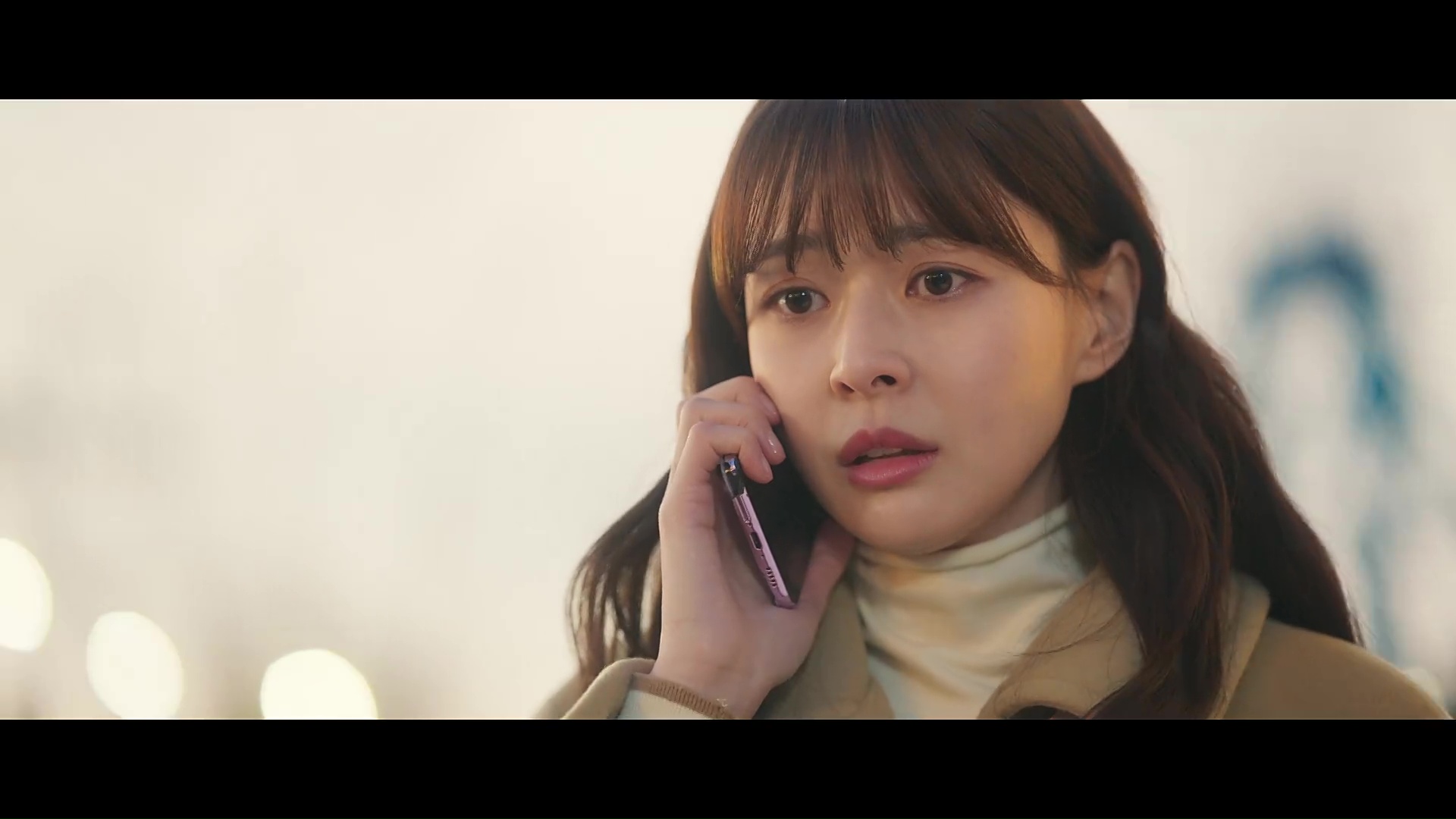
![[K-drama Treasure Hunt] Heart-fluttery bottle opening](https://d263ao8qih4miy.cloudfront.net/wp-content/uploads/2023/05/Kdrama-treasure-hunt.png)
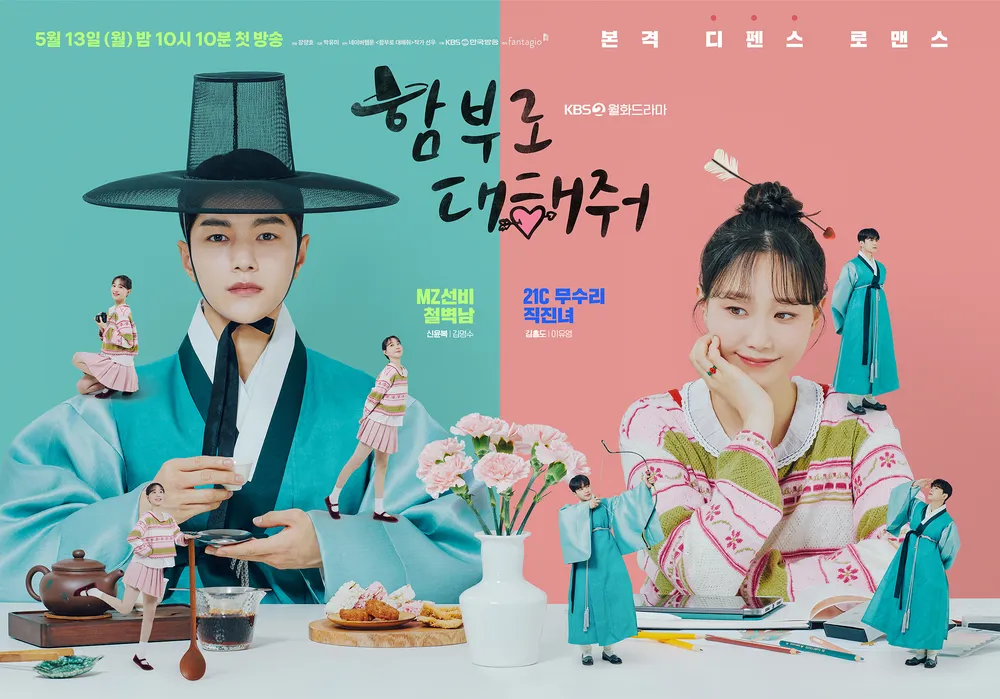
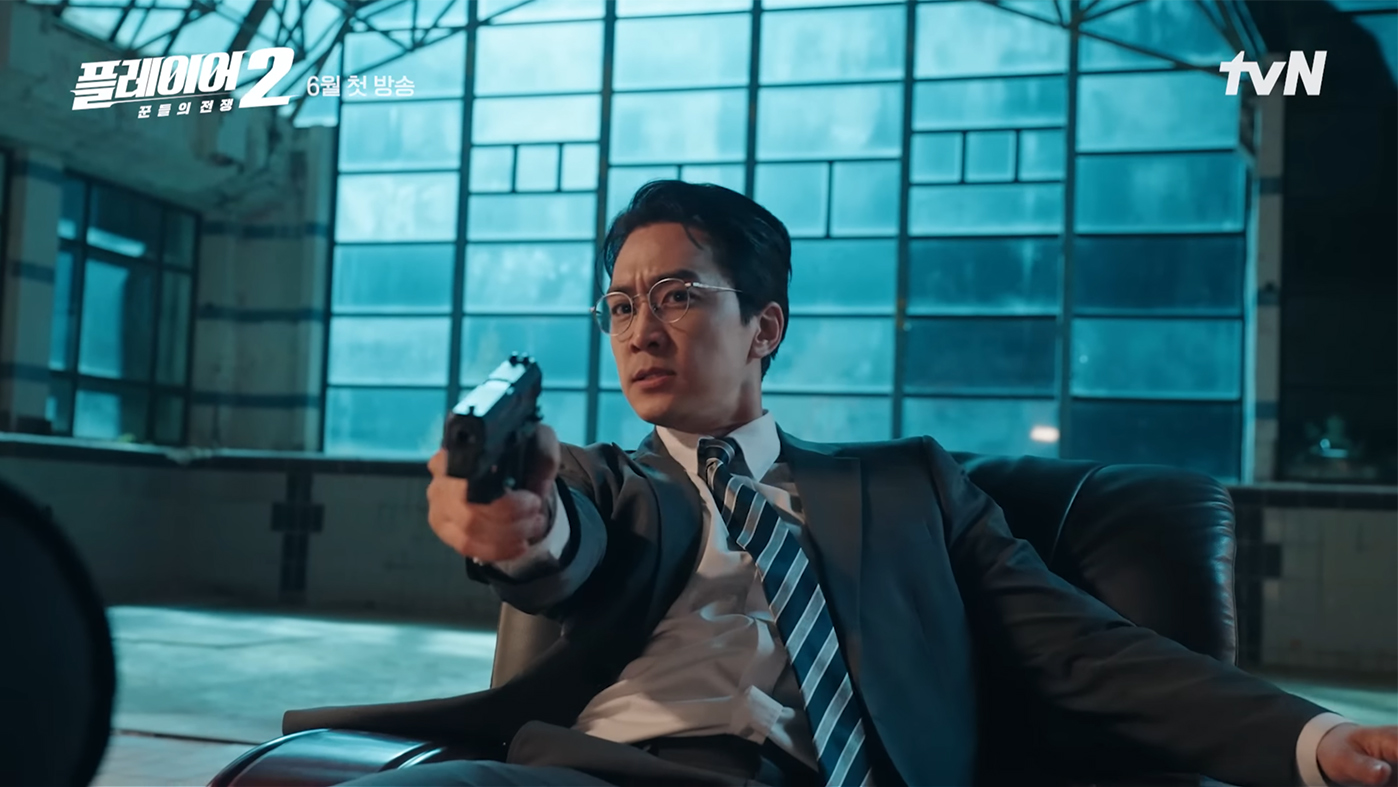
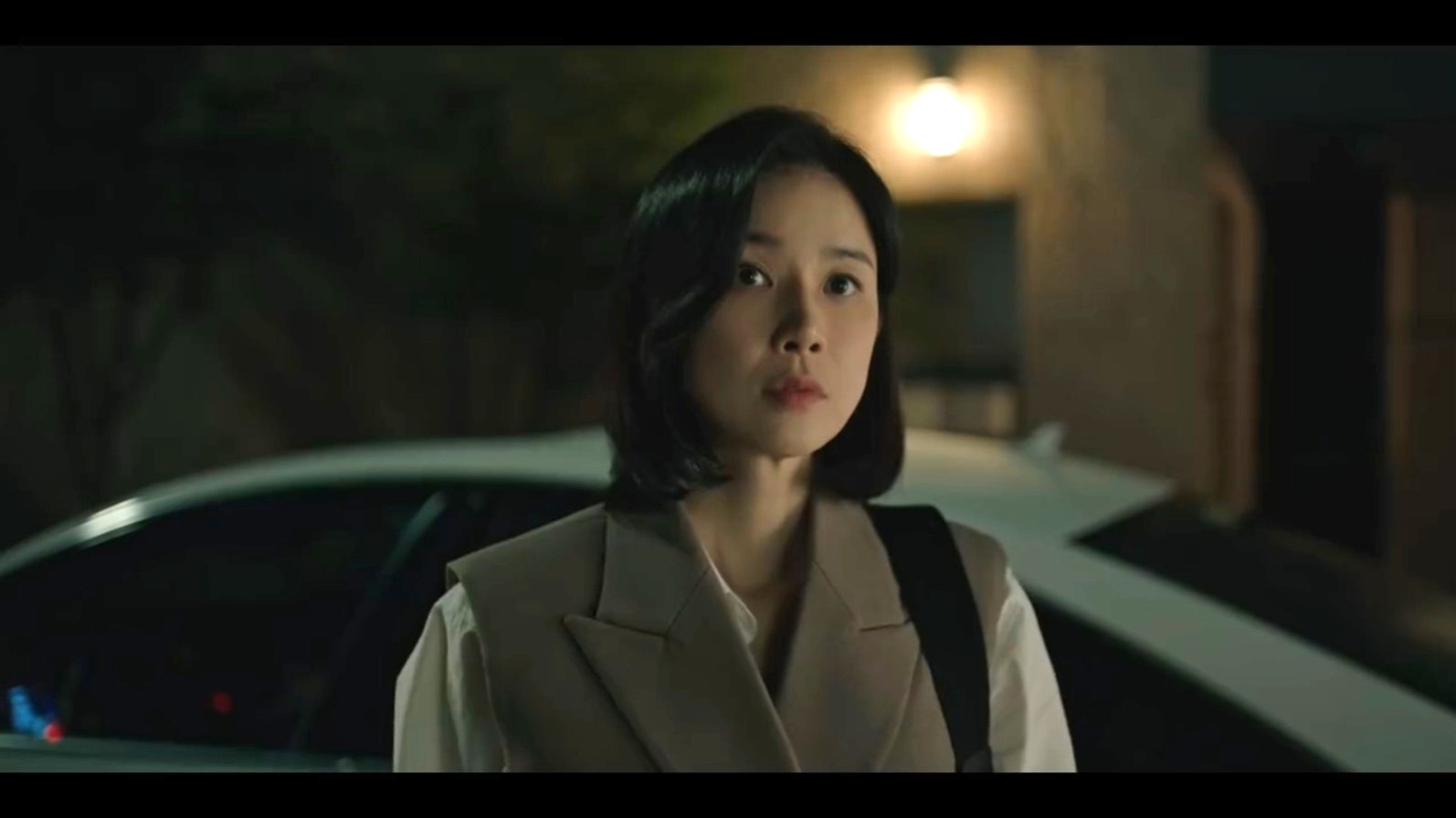
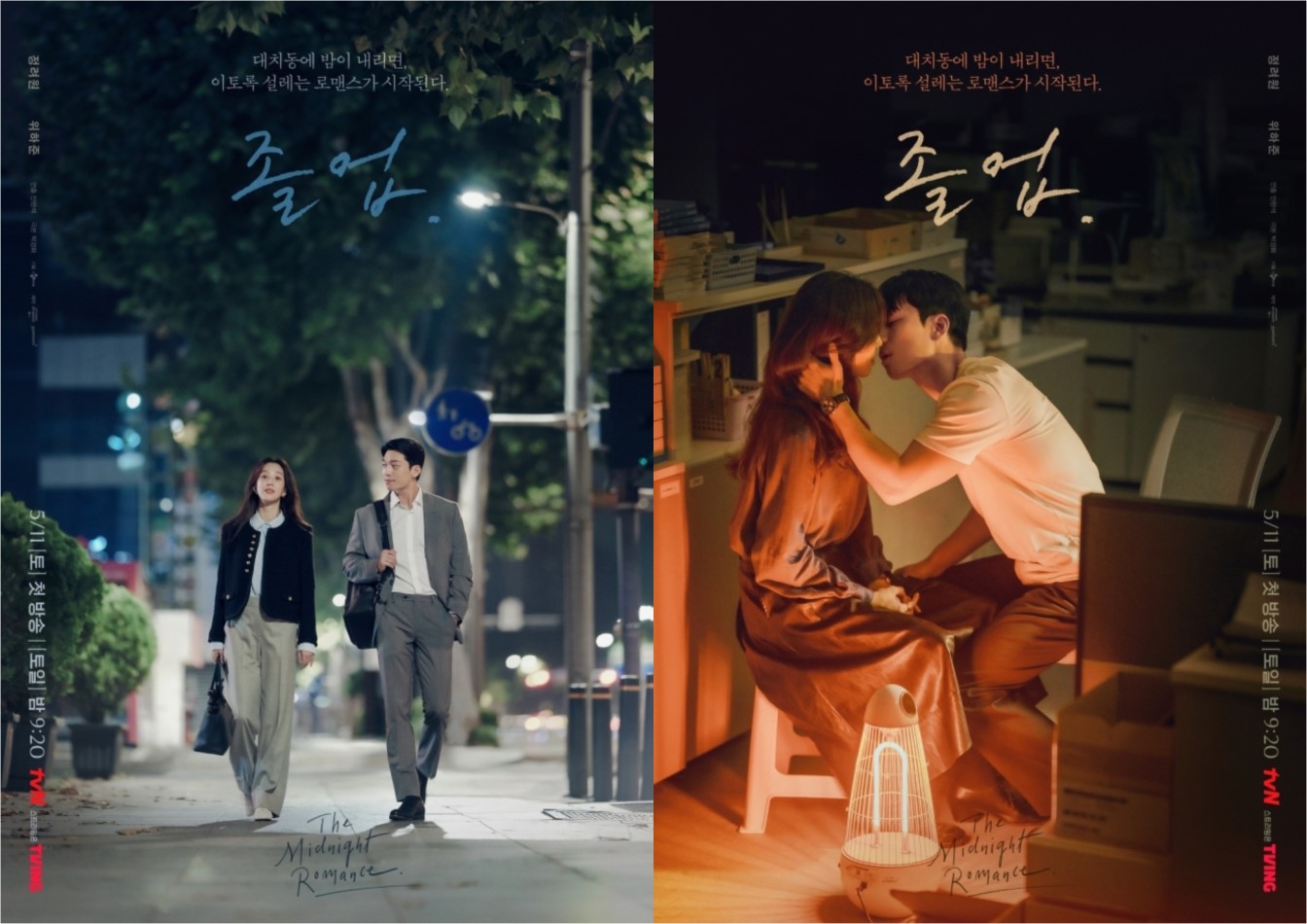
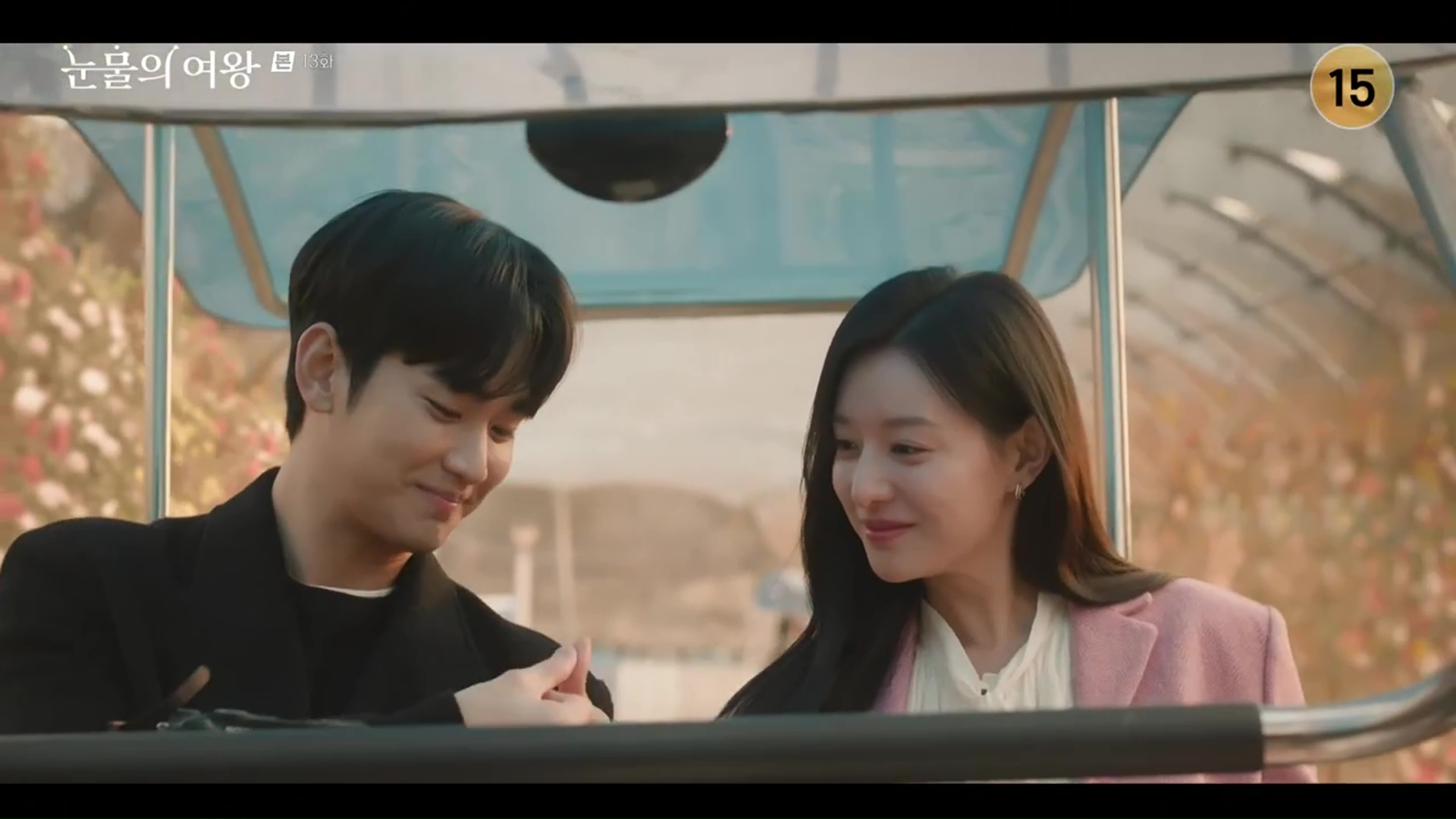
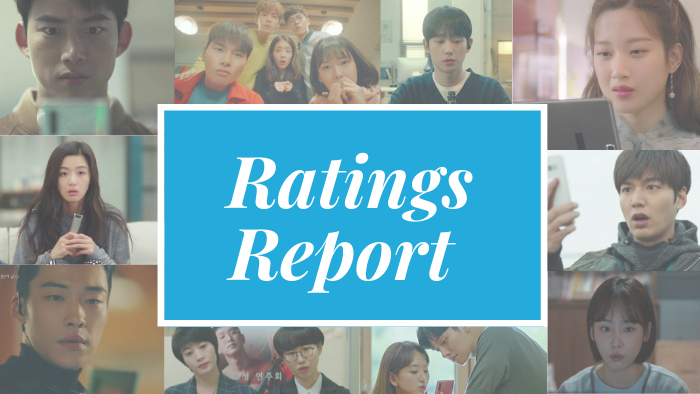
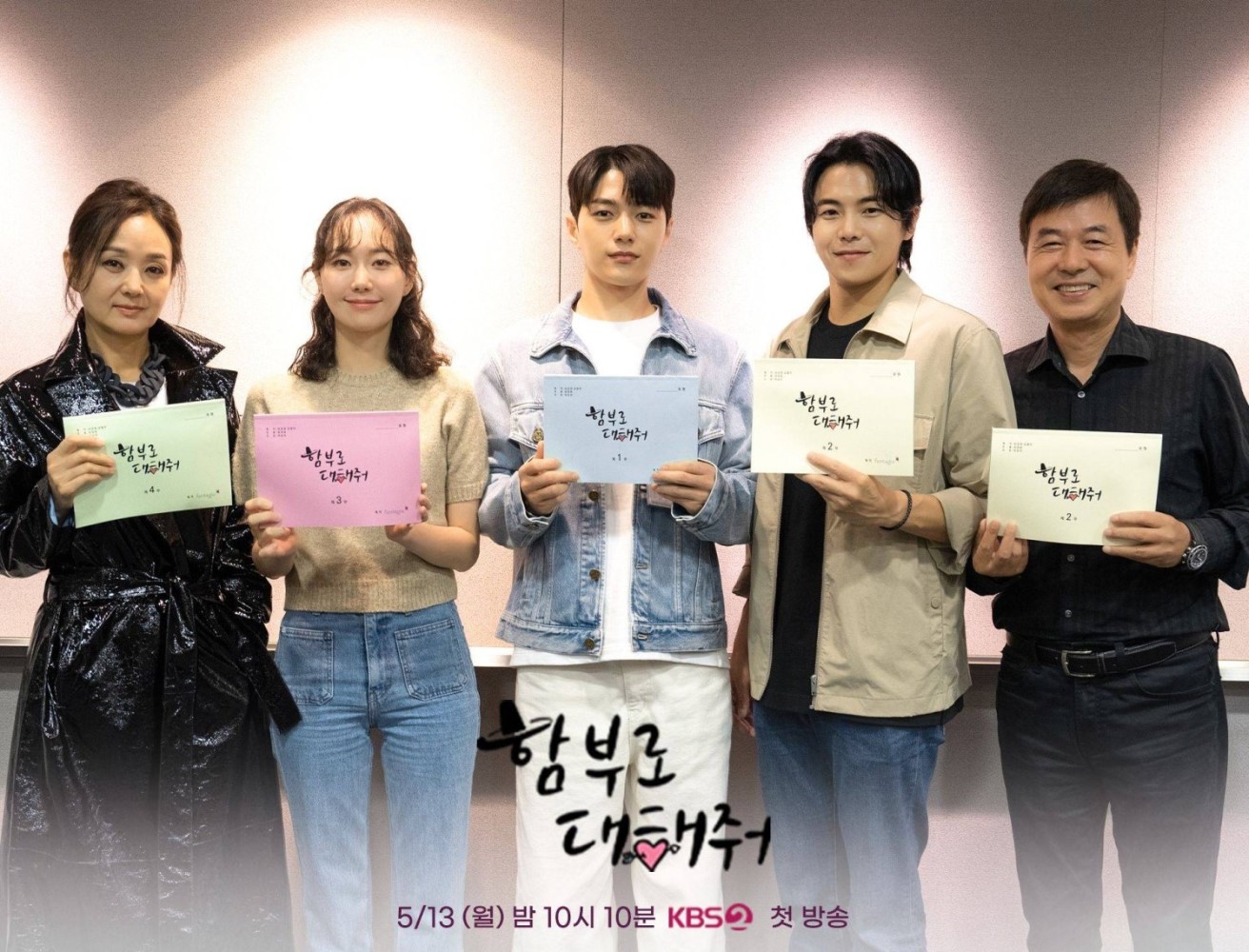
Required fields are marked *
Your email address will not be published. Required fields are marked *
1 Molly
June 13, 2014 at 11:18 PM
Oh yesss it's here! Thank you for the recap, dramabeans. I bet the multiple-personality disorder is just Chief Cha's sneaky way to escape the verdict.
Required fields are marked *
CaroleMcDonnell
June 14, 2014 at 5:12 AM
yeah... plant that "i go nuts at the word 'forgiveness'" defense in the brain. He's so controlling...even behind the scenes.
Required fields are marked *
Ennayra
June 17, 2014 at 7:23 PM
That's what I thought too. When he told his wife he had multiple personalities, I took that as him instructing her in the lies he's going to tell so that she can back up his story.
Required fields are marked *
2 owl 🦉 🫰
June 13, 2014 at 11:20 PM
Does Mu-yeom know he needs surgery? Either way, I fear he will keel over with a brain hemorrhage in the not to distant future. I am totally thrown by the fact that Oh Maria is way too close to the whole case as the victim of original Gap Dong. The fact that she let Cha in her trailer and didn't tell anyone that he pinned her against the wall - it's very scary where her mind is right now. it seems like being a psychiatrist is working against her. It's hard to know who will be Gap Dong's next attempted victim - his wife, Oh Maria, or Ji-wool...
Oh, and did I miss something when Cha said one of his personalities was a 7-year old boy who couldn't hear?
Tae-oh is the most interesting character, manipulative and manipulated, it's creepy. We saw very little of Chul-gon this episode but I sure hope he has something up his sleeve.
Required fields are marked *
CaroleMcDonnell
June 14, 2014 at 5:19 AM
oooh, yes!!! Wondering where he is leading with that 7-year old boy thing. Looks like he's aiming for the wounded child history. I was wounded as a child yadda yadda and my woundedness manifested itself in these four ways. Wonder if he has a trail all set to back up his false psychological history.
So far i feel this writer has studied a lotta true crime so I'm wondering if Cha would be aware of all his multiple identities. Often only one "master controlling" identity is aware of all the other identities and that master identity is rarely the primary personality. I trust this writer and so I feel he might bring that up to challenge Cha.
I can't help it though. I think Cha is full of it. I don't believe he has multiple identity. (HAsn't that been disproved of late anyway?) And although we did see a smidgen of his out of control anger when he furiously ripped up the love letter from days of yore, I don't think he is that emotionally out of control. Just because you have multiple identities doesn't mean you have no control over them.
I could be wrong but I just think Cha created all this scenario when he pondered the "perfect crime." He is that proud of his mind and his ability to understand all contigencies that he created a "perfect defense" as well. The game for MuYeom and Chulgon will be to find the flaw/achilles heel of this perfect defense.
Required fields are marked *
owl 🦉 🫰
June 14, 2014 at 8:56 AM
I agree, Cha is full of it. For about 1/2 of this episode, I began to wonder if Cha was sacrificing himself to get teh real Gap Dong to become careless because all the attention was going to Cha (who would not be Gap Dong in that scenario). But in the 2nd half, I decided that just wasn't plausible. I thint Tae-oh will crack the mind aspect of Gap Dong (he alone came up with the monument theory which he hasn't told anyone about yet. But he may tell Jil-wool who will put it in her webtoon and reveal his thoughts. Or maybe Cha will recognize it and go after her -
Required fields are marked *
CaroleMcDonnell
June 14, 2014 at 9:55 AM
Wow! You were still believing in Cha even in this episode! Ah, woman, woman!! We've all crossed over to the dark side by now. No more red herrings, i think. Except for maybe...possibly...the accomplice or the other murderer who inched him/her crimes into Gap Dong's masterpiece.
I swear I love this drama, despite it's flaws. It all seemed to easy in the beginning, compared to the weird confusion that was God's Gift. And I like the way the writer trusts the viewer. It's just been so fun seeing a drama go through all the angles and possibilities of the plot and the relationships. Some dramas get so repetitive in order to "explore" the story. But this one really goes to all the levels.
Required fields are marked *
3 hipployta
June 13, 2014 at 11:33 PM
20 years to prepare...totally fake but probably very difficult to prove
Required fields are marked *
4 poorthing
June 14, 2014 at 2:38 AM
Good episode even though I'm frustrated with Maria for believing Cha's act.
Required fields are marked *
windsun33
June 14, 2014 at 1:37 PM
She has so many issues of her own that she is not able to be objective at all.
Required fields are marked *
5 goodgirl
June 14, 2014 at 2:40 AM
Good episode even though I'm frustrated with Maria for believing Cha's act.
And I want to see YSH in a melodrama !
Required fields are marked *
6 Aly
June 14, 2014 at 3:42 AM
dr maria is such a sellout. all this time she was stern about wanting to get him and now she wavers so quickly. i don't blame him for being pissed off. they can't afford anyone weak in a case that they have suffered so much over. she needs to butt out until everything is solved. MPO lmaoooo. what a coward.
i do think dr maria and mu yeom are making a mistake in being so crappy to ryu tae oh. not in the sense that he deserves to be treated nicely, but because if they are actually serious about having him on their side then they need to play it more smartly. if you're gonna be super cold and insulting, obviously he is not going to be on your side and more likely to sode with gapdong who might have more to offer.
Required fields are marked *
CaroleMcDonnell
June 14, 2014 at 5:23 AM
It's like her Vixen character feels strong around Tae Oh because Tae Oh is so needy, and especially needy about her. Vixen has the power to emotionally hurt Tae Oh. And some part of Vixen/Maria (our true pseudo split personality) wants to have the power to hurt someone.
But then she goes back to the whole pure "I must be nurturing" therapist Maria and she just falls into the forgiveness/understanding paradigm. Vixen needs to meet Cha. She needs to be strong with a strong man, instead of being strong with needy Tae Oh.
Required fields are marked *
7 monda
June 14, 2014 at 4:14 AM
I like in this episode for watching the police department finally work together on gapdong, now that SCC is no longer be able to ruin their case from inside. The scene of Cha and Maria in her trailer scared me... as if he was possessed by demon. Is it just his acting? How creepy...
I don't really get the point why Jiwool tried to teach Tae Oh emotions. The sketches were cute tho.
All in all this is still a very interesting story and worth my hours for watching (other dramas have got me bored me really). Can't wait for ep18.. oops only 3 eps left!
Required fields are marked *
CaroleMcDonnell
June 14, 2014 at 6:04 AM
I think she wants to help him learn to identify emotions and to connect with them since he'd connected with non-emotionality all his life. There is so much about identity and self-identification going on in this drama. Who am I? Who do I pretend to be? And poor, poor, empty Loser is the ultimate empty person. Nothing to identify with. He's Tae Oh's mirror..Tae Oh's worse case scenario of emptiness. And a real embarrassment to Tae Oh's pride. Now that Tae Oh's hero is "caught" and Tae Oh's alter ego/mirror is acting the fool....what else does Tae Oh have but the final hope to be a human with emotions? Ji Ul would make a great therapist.
Required fields are marked *
trav
June 14, 2014 at 6:20 AM
I wonder why Loser is still alive... I mean, he acts so aggressively towards Tae Oh, he's been a fraud that pushed Tae Oh to start killing, and if Tae Oh is such a psycopath (and his pride's been hurt, which it has), why hasn't he gotten enraged and snapped Loser's neck yet?
Required fields are marked *
CaroleMcDonnell
June 14, 2014 at 6:25 AM
The shame, I think. To get angry at one's shame is to show that the shame actually had power over you to get angry. If we consider the Eiffel Tower metaphor, we have a monstrosity that grew on people and became beloved. The transformation of something hated with an expiration date into something wonderful, something notorious became something for the history books. When Gap Dong looks at it, it symbolizes his greatness. When Tae Oh looks at Loser, he sees his stupidity. This is why Gap Dong could never change...he had something symbolically showing him how great he was. Tae Oh seeing Loser day in day out (before he ended up in his luxurious hospital stay) showed him his emptiness...and might lead to his healing.
I so don't know if psycopaths can be healed but I like Ji Ul's arc. It's optimistic and yet practical.
Required fields are marked *
Molly
June 14, 2014 at 12:30 PM
Aahh whatever happened to that poor Poopy/ Looser.. I wonder how the writer will end his story. He had attacked Ryu Tae Oh twice.. is there punishment for mentally ill inmates?
Required fields are marked *
windsun33
June 14, 2014 at 1:39 PM
In a real facility they would not be allowed to wander freely with the general non-violent inmate population, but this is k-drama land.
Required fields are marked *
8 CaroleMcDonnell
June 14, 2014 at 5:10 AM
Wow! This show is just surprising me as a k-drama lover. Everything is flowing so well!
This has got to be one of the most maternal episodes -- all about female nurturing. The wife, The mom, Ji Wul as mommy-therapist-healer, Maria as (attempting to be) true sane therapist. The funny thing with all that nurturing is that it's not really pure and self-less. All the female nurturers are invested. Which i guess is part of female nurturing but wow, Ji Wul...did you really have to go there? Why is it important to you to see his humanity?
I love Mu Yeom's comment that he is tired of the women in his life. Cause, although I think there is a heavy dose of noble idiocy going on and he's preparing to die, there is a heavy bit of truth there. Older Monk has always been the maternal figure, taking care of the young boys. And I really, really, really love the whole idea that young boys need nurturing. Whether it's a monk, a mentally-disabled father, or a rich mom who goes overboard. But now, in addition to the monk being a figure who is caring, we have all these women...which just feels right. But Older monk has always been very pure in his live. At least he isn't (as far as we know) trying to make up for his past errors or trying to balance past behavior.
Cha's wife is interesting as a nurturer, care-taker...doing everything she can in the way Tae Oh's mom did. Has she seen his good side? She doesn't feel threatened? Could Cha have given her such good husbandly love that even though she knows the truth she doesn't care that he's a murderer?
I am really loving this drama...even when it fails.
Thanks for the recap.
Required fields are marked *
Peridot
June 14, 2014 at 12:40 PM
As always, Carole, I appreciate your insights. I look forward to all of your individual comments and replies on this drama thread.
Required fields are marked *
Molly
June 14, 2014 at 12:42 PM
I really love your point of view and how you write it^^ I always look for your comments. There are so many aspects this drama had conveyed and sometimes they just went unnoticed because we were distracted or paid too much attention to the core story. We need people who can highlight the other sides of the story for us, haha I hope I make sense.
I guess everyone who follows Gapdongi agree this is not your ordinary drama. I fall in love in this drama and I don't think it fails at all.
Required fields are marked *
CaroleMcDonnell
June 14, 2014 at 2:06 PM
Thank you so much. I really like what the writer is aiming for. It's as if he/she had to wade through all the procedural stuff to get to the psychological stuff he/she is really fascinated with. And we were patient viewers who believed in said writer. Makes me happy.
Required fields are marked *
windsun33
June 14, 2014 at 1:48 PM
Maybe she really doesn't know about her husband - that flashback might have been a delusion, or she may have just taken it as some metaphor.
Required fields are marked *
CaroleMcDonnell
June 14, 2014 at 2:08 PM
Wonder why Cha looked at his wife like that? Remember that moment when he was playing with his daughter and turned to look at good wifey doing the dishes? Gave me the creeps and made me worry for her.
Question:
Back in the day i used to know the difference between sociopath and psychopath...and now I'm somewhat lost as to what the meanings/differences are.
Required fields are marked *
Lilly
June 14, 2014 at 6:40 PM
Psychopaths are fearless; sociopaths aren’t.
Psychopaths don’t have a sense of right and wrong. Sociopaths do understand right from wrong but just do not care.
Psychopaths lack the proper neurological frameworks to develop a sense of ethics and morality. There is no cure.
Born with permanent brain damage.
Some sociopaths can be treated and changed.
http://www.medicaldaily.com/whats-difference-between-sociopath-and-psychopath-not-much-one-might-kill-you-270694
Required fields are marked *
Lilly
June 14, 2014 at 6:50 PM
Car race to cliff.
Psychopaths do not chicken out from what I have read.
Sociopaths do.
CaroleMcDonnell
June 15, 2014 at 6:47 AM
thanks!
CaroleMcDonnell
June 14, 2014 at 2:01 PM
Thanks, guys! I am waaaay too obsessed with this drama.
Required fields are marked *
Lilly
June 14, 2014 at 6:55 PM
I am thinking that when they did the race to the cliff in the cars in revealed that Ryu Tae Oh is a sociopath and not an incurable psychopath maybe.
Required fields are marked *
CaroleMcDonnell
June 15, 2014 at 6:49 AM
thanks! If this drama is to end with hope, then...
Required fields are marked *
9 trav
June 14, 2014 at 5:12 AM
lol at Oh Maria reading about dissociative disorder on Wikipedia... What kind of a psychiatrist is she?
All episodes long she didn't seem like much of a professional to me (even without considering her victim status which oh so often clashes with her professional views and objectivity).
Required fields are marked *
CaroleMcDonnell
June 14, 2014 at 5:25 AM
lol! Can't stop laughing. Yes...that is kind of like...."So, writer-nim, the prop department can't find a psychology book anywhere? No more funds to buy props?"
Required fields are marked *
trav
June 14, 2014 at 6:09 AM
Yeah! I mean, she could look into her 'college notes' or something, there must be some kind of a base where all those disorders are desribed, special-purpose sites for psychiatrists but not the Wikipedia, please, no.
Required fields are marked *
CaroleMcDonnell
June 14, 2014 at 6:37 AM
LOL! Oh gee. So true. But obviously the wikipedia site is helpful. Cause apparently Ji Ul must be looking at them to learn about therapeutic art for psycopaths. You can learn a lot on the internet. I will admit, though, that when I saw Tae Oh hitting the nails, I beamed with pride: "My baby is growing up. He now hammers nails instead of human heads." I was so proud. So yeah, anyone can be an effective therapist...from wikipedia and movies. Psychological training optional.
Required fields are marked *
windsun33
June 14, 2014 at 2:01 PM
There are medical sites like that, but they are pretty expensive from what I have heard.
But on the other hand, if you just need a quick rundown on something, it is far faster to type in a couple of keywords and get results in 3 seconds or less that dig through books.
Required fields are marked *
Emily
June 14, 2014 at 9:55 AM
I had a doctor look up something on wikipedia in my appointment once. A relative has had a doctor google something in front of her. It does happen. D:
Required fields are marked *
windsun33
June 14, 2014 at 1:56 PM
It happens a lot, but in this case she looked up something that even a lot of non-doctor people know about, and I would think would be covered in first year of psych school.
Required fields are marked *
Molly
June 14, 2014 at 12:18 PM
Exactly my thought when I saw her screen! Like "isn't she supposed to have journals subscription? why wiki?" LOL we expect too much realism from a drama
Required fields are marked *
windsun33
June 14, 2014 at 1:52 PM
I got a good laugh out of that. She has always seemed pretty unprofessional and to lack a lot of basic knowledge.
Required fields are marked *
10 Miky
June 14, 2014 at 6:27 AM
I guess the writer saw or read William Diehl Primal Fear Books and modeled Cha Do Hyuk character after the brilliant psyhopath character Aaron/Roy from the series
Required fields are marked *
CaroleMcDonnell
June 14, 2014 at 7:21 AM
I am so looking forward to the moment when Cha's smug pride in his intellect is broken.
Required fields are marked *
Molly
June 14, 2014 at 12:23 PM
This show surely makes my brain working harder which is good.. It has been resting for too long LOL
Required fields are marked *
11 blo
June 14, 2014 at 9:02 AM
I know the reason they had her look up DID was probably more for the viewers sake, but I wish they had done it a different way as it only makes her look like a fail psychiatrist. Honestly though, can't the drama just assume its viewers are smart enough to know that much? ahhhh Gap Dong...I want to like you so much but things like this aren't helping.
Required fields are marked *
12 Fight the bad feeling
June 14, 2014 at 11:04 AM
"Can we stop humanizing the killer."
Thank you javabeans for that line. I think that would be the biggest gripe I have with this show. It might not be the intent but boy it does have that effect with some people.
Again, Ji Ul's character confuses the heck out of me. I just can't see where the motivation and logic of her action comes from. Naivety can be an excuse but only up to a certain point and in my opinion she has crossed that line a long time ago. It would have been better if the character was given a real moment where the audience could pinpoint, or at least imagine where her drive of helping a serial killer comes from. Heck, even a measly narration of her inner thoughts might suffice. Just give me something.
On to some underlying issues in the episode, should people try to understand serial killers? Yes, absolutely. Do they deserve sympathy? In my opinion, no. Can they change? Sure, maybe. Do they deserve a chance to change? In my opinion, no.
Required fields are marked *
CaroleMcDonnell
June 14, 2014 at 12:06 PM
I'm thinking it all depends on what we mean by humanizing. IF "humanizing" means "trying to find a way to love and understand the killer" then we have the question Mu Yeom posed to Maria. Why must we understand those who have wounded us? Maria says "in order that I can be free." (I think she also said that Muyeom would be free too, but am not sure.) This is the whole "if we understand our enemy, we can forgive them. And our unforgiveness toward those who wound us cages us and damages us as much as the original cruelty inflicted on us.
MuYeom of course doesn't like that. And the more I think about it, the more I see that he really is disappointed with the maternal/nurturing aspect of human nature (or at least in the women around him) that wants to see a reason to understand a cruel person.
Personally, I'm not too keen on understanding my enemy's pain. It would be good to say "Such and such a person did this to me because they were sick mentally" cause it makes life less terrifying and it makes me feel like less of a loser who just came upon the Big Bad becasue of plain old bad luck. And it certainly makes the evil in the world more understandable. But heck...understanding the pain of a perpetrator can just belittle our own pain. And honestly, sometimes I don't want my pain belittled. Which is why Mu Yeom is so pissed about the women around him.
But if by "humanizing" we mean "criminals are not humans" then that's wrong. Sad fact #1: We all have it in us to be quite monstrous. Sad fact #2: The word "human" encompasses all sorts of evil --pitiful or not.
Gap Dong is as human as all of us and perhaps some folks never committed murder because they simply were not rich enough (Tae Oh) or arrogant enough to think they could create a perfect crime (Gap Dong.) And then there are those who commit crimes because they are Losers. ;-)
Required fields are marked *
Fight the bad feeling
June 14, 2014 at 1:11 PM
I actually agree with your reply wholeheartedly. I guess I used the word a bit loosely. Definitely didn't want to convey the message that criminals are not humans.
I am all for understanding serial killers but for the right reasons. And the only sound reason in my opinion is for the benefit not of the killer, but those affected by them (if they choose to do so, in Maria's case) and society in general (lessons that can be learned from the case to prevent such thing from happening again).
The problem with the process of understanding their motives and respective circumstances is that people from the sidelines might fall in to the trap of rationalizing and/or reducing the crimes of our perpetrators as mere consequences of their unfortunate circumstances. Sure it would have affected them but it takes more than that to premeditatively rape and kill 9 women. I guess what I meant when I said to stop humanizing them is to stop giving them excuses because frankly they don't deserve it.
Required fields are marked *
CaroleMcDonnell
June 14, 2014 at 2:13 PM
Yeah...we tend to equate understanding with excusing/forgiving. Maybe it's human nature to forgive and excuse what we understand. I do hate the idea of folks getting away with evil though.
Required fields are marked *
windsun33
June 14, 2014 at 2:07 PM
I can see a lot of good reasons for understanding the "why" someone did or does something, but I think she is carrying it way past that boundary.
Required fields are marked *
Lilly
June 14, 2014 at 6:15 PM
Yes, it is real life and it is everyday life. Nice guys wonder why nice girls chase after or hold on to thugs and nice girls wonder why nice guys chase after and hold on to total biotches.
When confronted you get the lame excuses, they make them feel special, they need them, they really love them, and on.
The process to manipulate emotions by criminals and just plain bad people is called "grooming". They use emotions of the people to block their minds from using logic. They search for emotional triggers to work off of.
If you think of it like propaganda built up slowly over time, testing what works and does not work till in is a fine skilled craft, you can see it in everyday life.
Required fields are marked *
13 Peridot
June 14, 2014 at 12:59 PM
Without sounding sexist, I wonder if women are more inclined to humanizing or trying to humanize perpetrators of evil than men are. In some ways, I think that women can be a little too trusting of people (even strangers). I believe that some experiments relating to this question have been conducted. I am not making any assertions--after all, I'm a woman and I never trust people blindly--but I just wonder if biology can afford some answers to these questions.
I do not know if Taeoh can be 'cured,' but I can see why Jiwool wants to believe that a miracle can happen. And although Taeoh has done evil things, he is still human. Do we still think that he is human? How do we define humanity? If his brain does not allow him to feel "normal" emotions or be able to express what he feels, then what does that mean? How are we to judge him? Obviously, we agree that he cannot go free after committing seven murders (which we, as drama viewers, know he definitely committed). The question of what makes us human is dangerous indeed. If we start making a checklist, what happens to individuals who do not match each criterion? Life has shown and continues to show us that definitions/understanding of humanity have been used to justify great evil. I hope that I have expressed these thoughts and questions clearly. I welcome the insights of all those on this drama thread :).
Required fields are marked *
Lilly
June 14, 2014 at 6:18 PM
Two words as answer -
Gold Digger
Required fields are marked *
14 CaroleMcDonnell
June 14, 2014 at 2:23 PM
So scary though...giving up on someone....to say they can't change. And where is that fine line between changeable and not changeable?
And if someone is changeable, how much change is necessary? If Tae Oh can learn to deal wth stress and boredom without killing, if Tae Oh doesn't have the need to show how dang smart he is, if Tae Oh learns not to harm living things (even if he doesn't quite think of humans as valuable and should not be hurt), if Tae Oh learns how to be empathetic, if Tae Oh understands pain of other people (did you see how freaked out he got when he himself got hurt...and when Ji Ul held the hammer over his head?)
If Gap Dong has changed after all these years! That is the big question. Prison is for rehabilitation and punishment. Penitentiaries are for the penitent. I can see Tae Oh understanding the fear he caused in others and learning not to like causing pain to people. I can even see Gap Dong as rehabilitated in that his killing days might be behind him. But I'd still want Gap Dong punished.
I do tend to think that women are biologically prone to do the understanding/nurture thing. And on a totally shallow level, I think psychological surveys show we are also more prone to forgiving pretty and childlike men. Maybe because they're cute or maybe because we feel they didn't have proper mothering (as if we would do better.)
Required fields are marked *
CaroleMcDonnell
June 14, 2014 at 2:24 PM
oops, Peridot! That was supposed to be under your thread. Sorry... the brain today.
Required fields are marked *
Peridot
June 14, 2014 at 4:11 PM
Good point, although I'm less inclined to forgive pretty men :). Pretty is not a free pass, lol! I know what you mean though.
Required fields are marked *
15 blaze
June 14, 2014 at 4:45 PM
Maria is like the worst psychiatrist.. ever! Seriously. And I dont even dislike the character. Its just that she isnt suited as a shrink. at. all. Girl needs to get her own treatment at first. Makes me angry how she treats Tae Oh considering he is a patient and needs professional help, but she just plays her games of power with him.
I like her (esp. her vixen side), but she really needs to quit her job.
Required fields are marked *
Lilly
June 14, 2014 at 6:01 PM
Ol Gap Dongi has been watching her.
She is the one with Disassociation Disorder.
Dressing up in different clothes and wigs as her personality shifts was a dead give-a-way.
He knew that diagnosis would be her weakness.
He is so smart.
Required fields are marked *
16 Lilly
June 14, 2014 at 5:58 PM
Aww, look at that cute scary face of Jung's in the picture.
Enough to turn your hair white.
I love this show.
Might be my favorite for this year.
Required fields are marked *
17 minitwin
June 14, 2014 at 9:36 PM
Okay so I'm a little late to the party (and someone please correct me if you disagree with what I'm saying)
The MPD usage really annoys me (I have no reasons...one's legit and one is kinda...)
1)I've taken 1 abnormal psych class in my entire life and after the lesson on dissociative disorders our teacher gave a long talk on how there are many well known psychologists who aren't even sure MPD is real. I can't even look at it the same way after that.
2) I don't know about in other countries but I've seen it used as an easy-way-out in a lot of American TV and it's just so dramatized and ugh.
Required fields are marked *
minitwin
June 14, 2014 at 9:37 PM
*two...wow that's a bad typo.
Required fields are marked *
CaroleMcDonnell
June 16, 2014 at 9:10 AM
Yeah, in the past few years there's been studies that show that the MPD thing is all bullshit. There were tons of machinations having to do with the Three Faces of Eve and how that affected American psychological studies.
In the US, I don't think it's used in court cases.
Required fields are marked *
18 Cindylawper
June 19, 2014 at 11:49 AM
After watching the ep 17. I feel like being shrouded with tons of worry and it keeps me on tenterhooks, the bullet lodged in Mu Yeom’s frontal lobe could be giving rise to fatality any time, I shall believe the writer do know how to savior Mu Yeom’s life in the end. I may not expect so much of a happy ending but the least the hero must survive till the last, am I greedy ?
The moment Oh Maria tries to free herself from the wringer of pain, she is at the disposal of neglecting how Mu Yeom will feel at the same time…. Her twist of displaying her pro ethics of empathy towards the inhuman killer is wrenching justice laid in the hand of God. If she’d ever thought of this by freeing the killer with assumed mentally disorder equates the freedom of her soul, she is pushing Mu Yeom to the doom beyond redemption.
I feel no sorry for Mu Yeom to dart out the words of 'splitting up' as it’s too heavy for Mu Yeom to sustain his pain and suffering, though I might feel very sad of their break up….
The lady he loves is betraying his soul and inspiration to wrench the evil under justice. The interrogation carried out in the interrogation room is something which is the most unforgettable grilling for both Mu Yeom and Oh Maria, and it’s ironic enou as if God is playing a joke with them.
Sad to say Mu Yeom’s upset and despair have come to another loose end when another gal by his side Ji-ul thinking she might twist the monster back to the human path, is playing a joke with the God, not knowing devils are much more bloodthirsty than what is in sight of every normal human act ! If a devil tries to wring something out of her for his own goods, she wouldn’t see any mercy in his eyes at all. When she experiences the God’s grace , she shall never forget HMY is her life savior. Thus she
learned this from Mu Yeom, with a hope that every human being needs a saving grace as she does.
It comes to the same thing, Ji-ul, still in her salad days, throws Mu Yeom into another scale of fidget again !
One is mature enou to handle herself go beyond imaginable,while another one is ignorant enou to push herself to the edge of the ridge. Hey, it’s no fun at all, I’m juz wondering what in their minds the stuff is all about ! ! !
Required fields are marked *